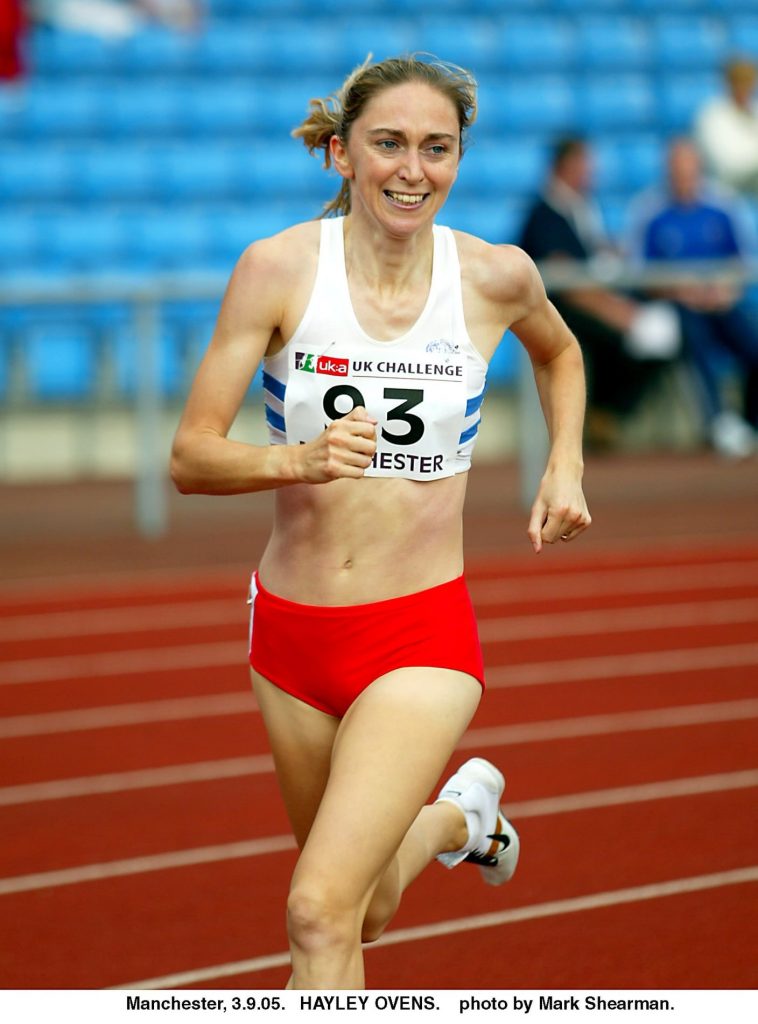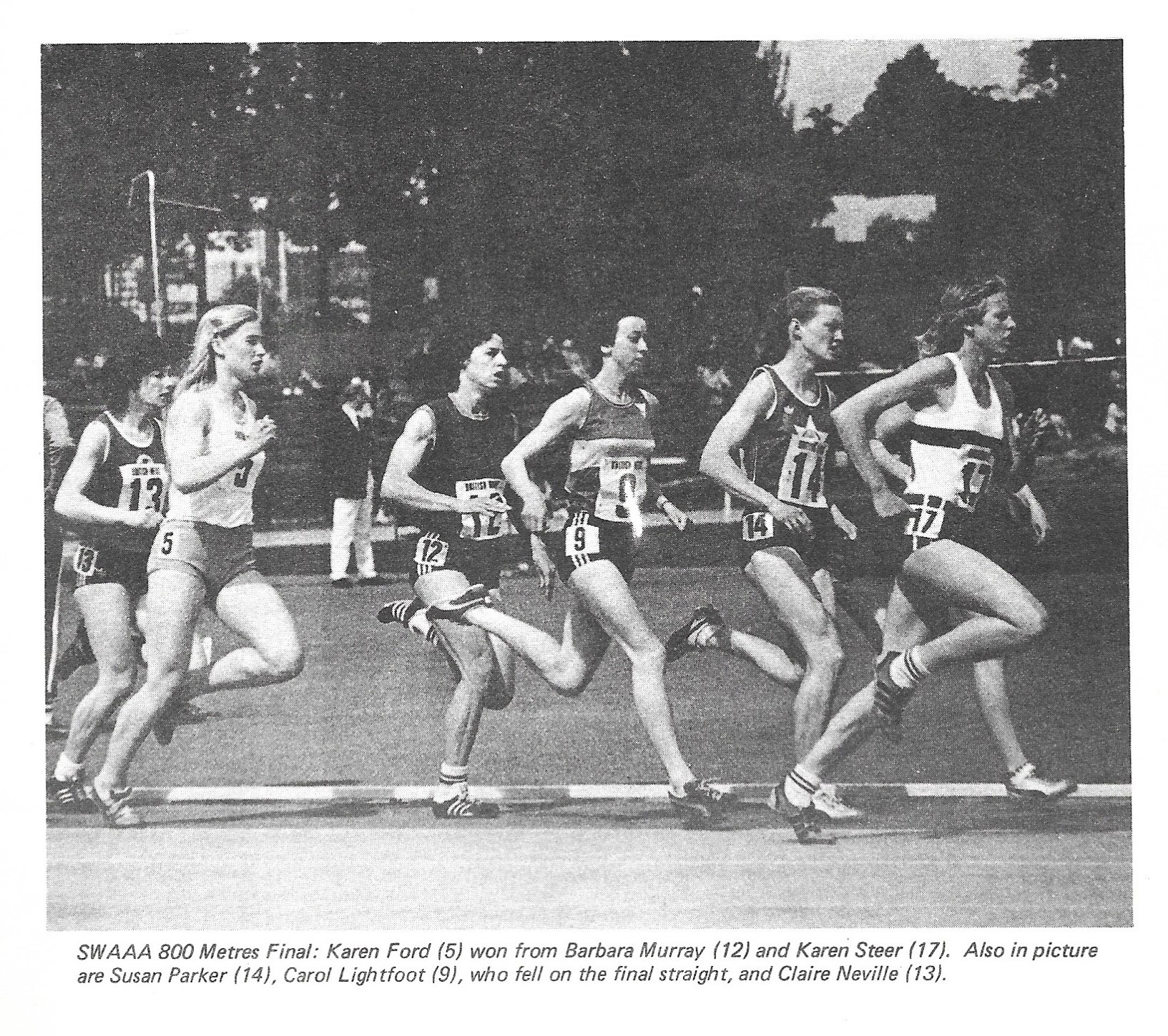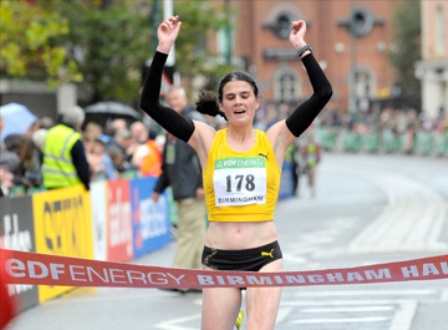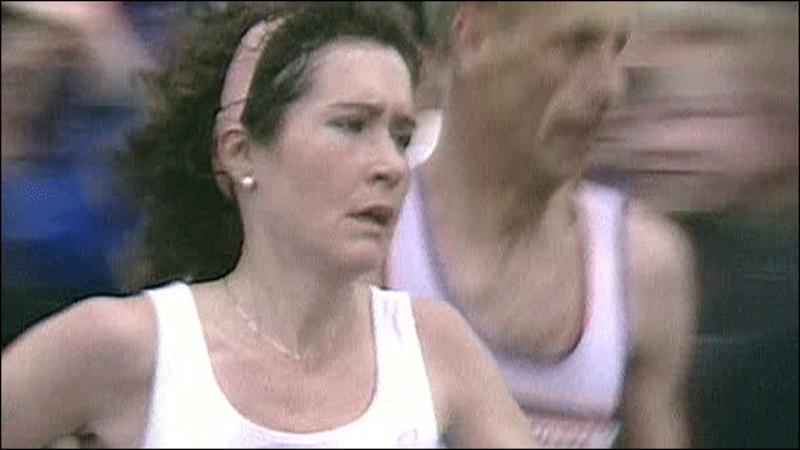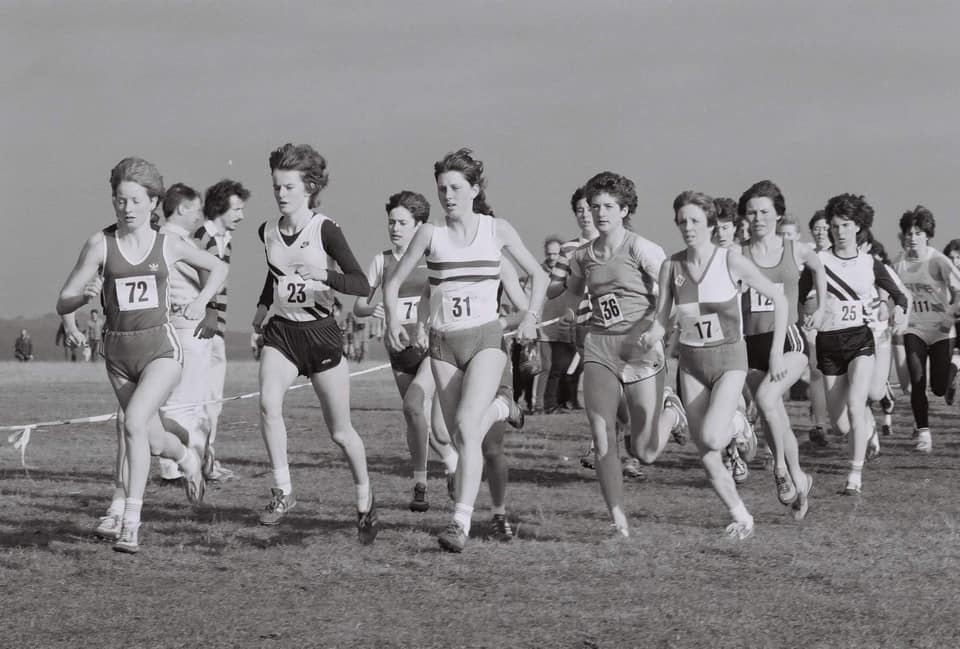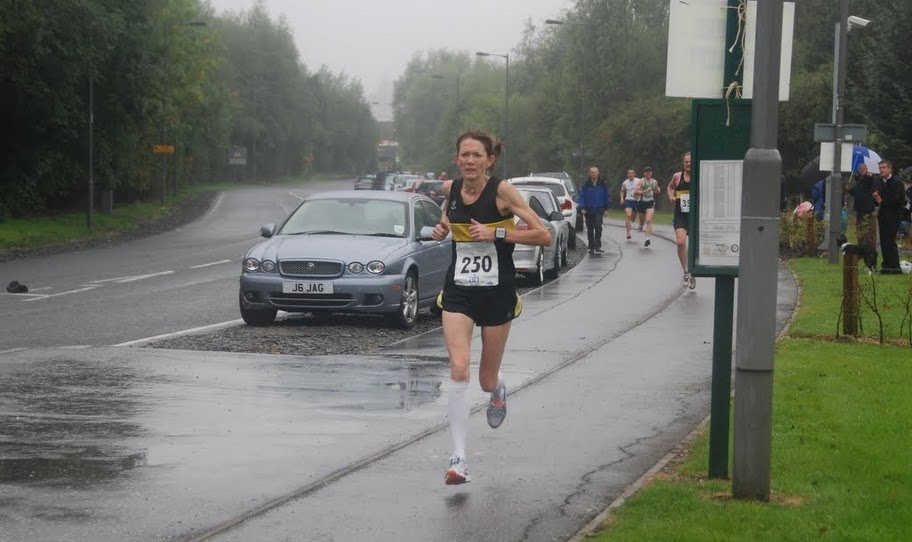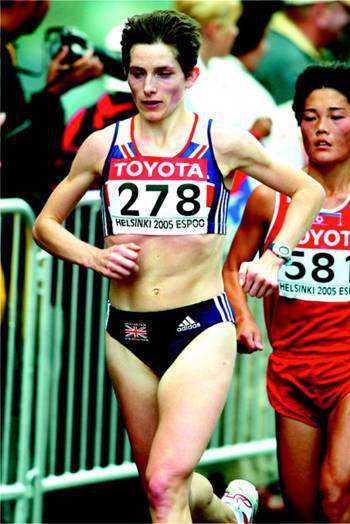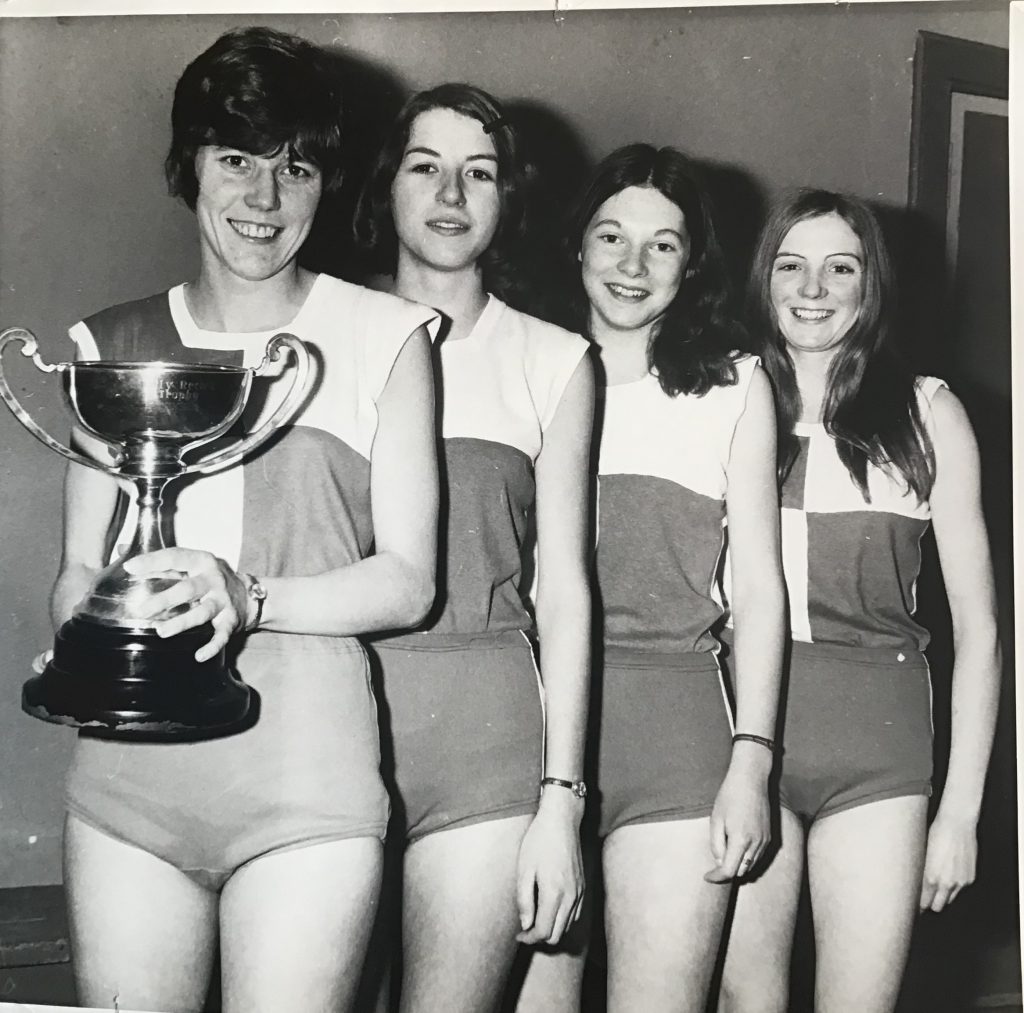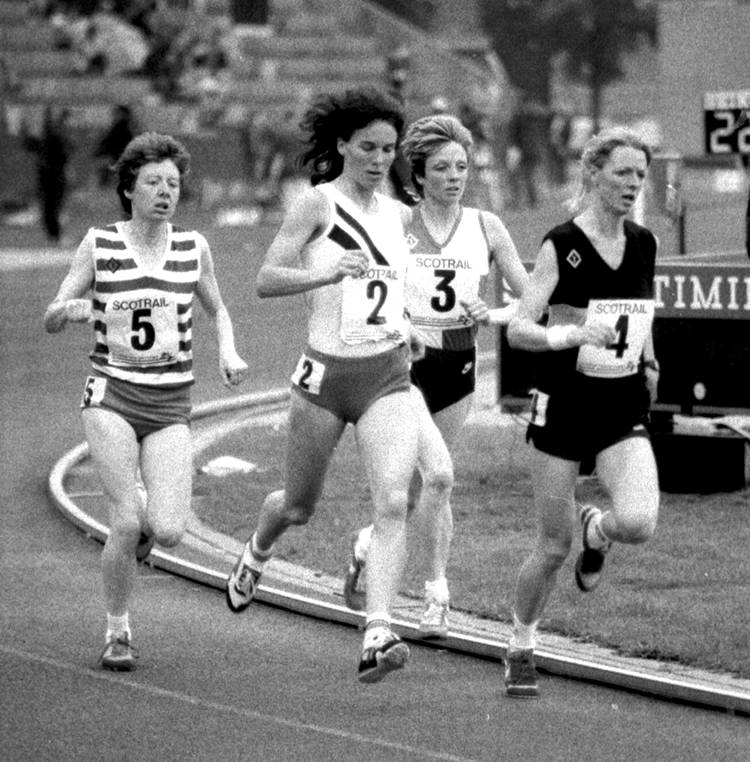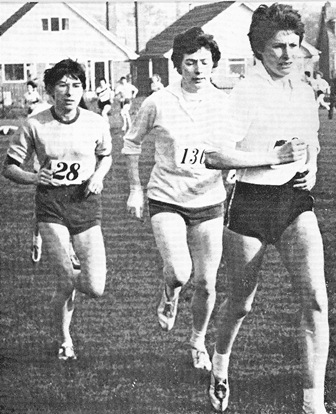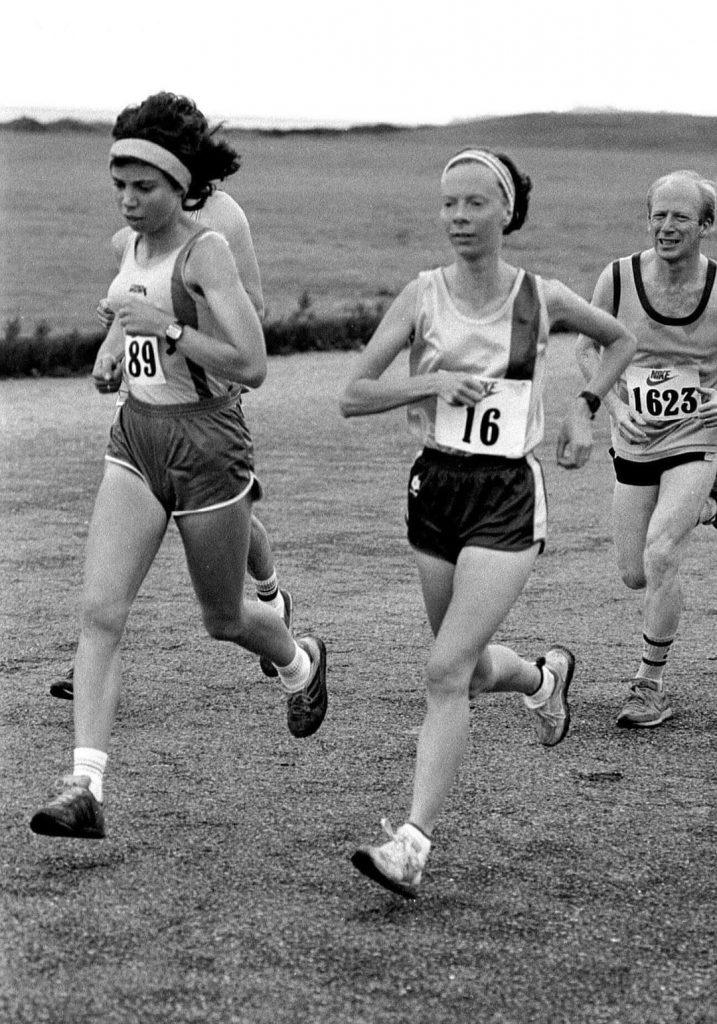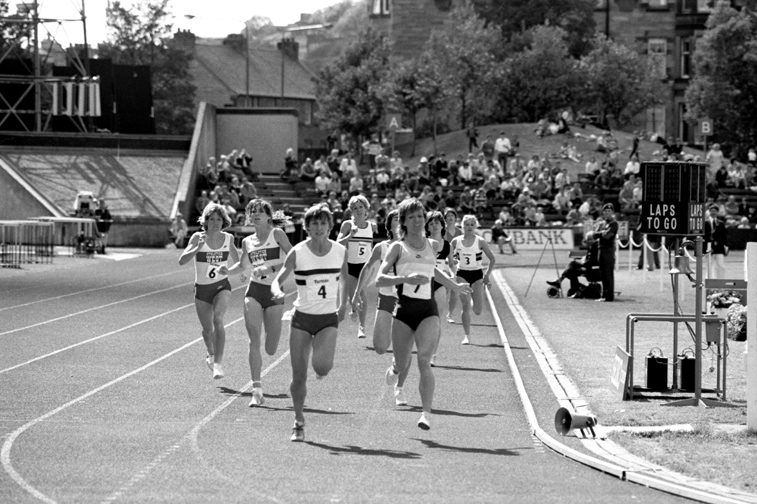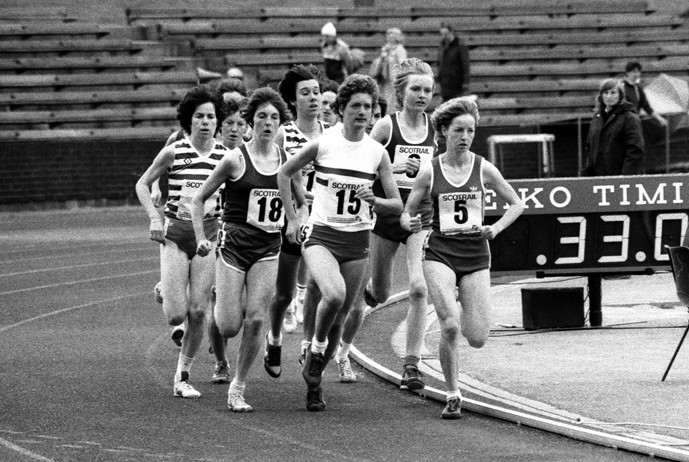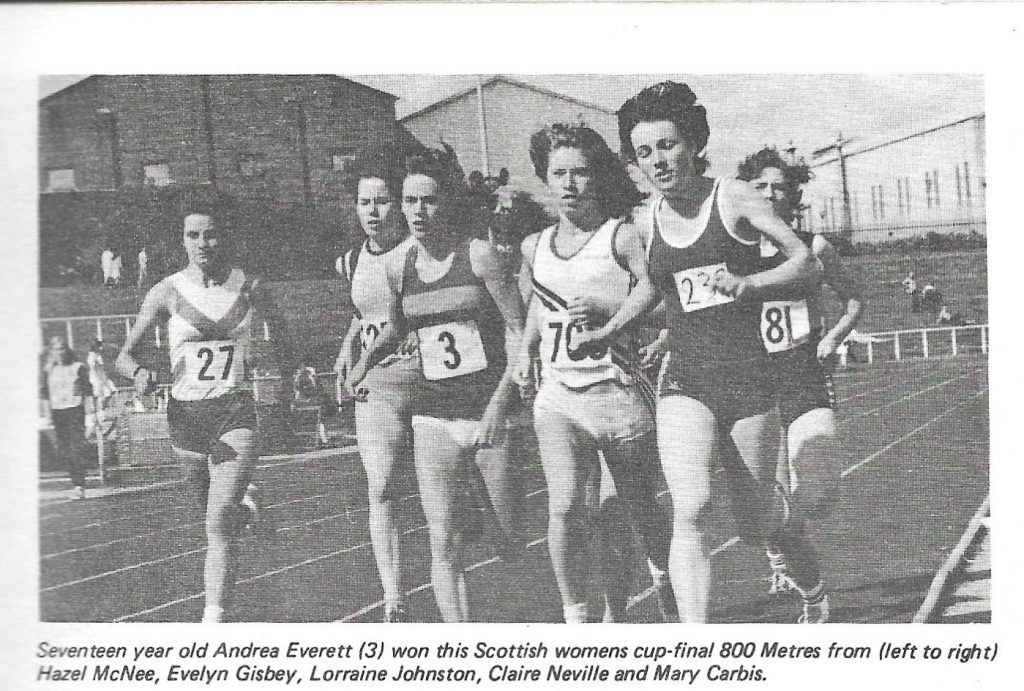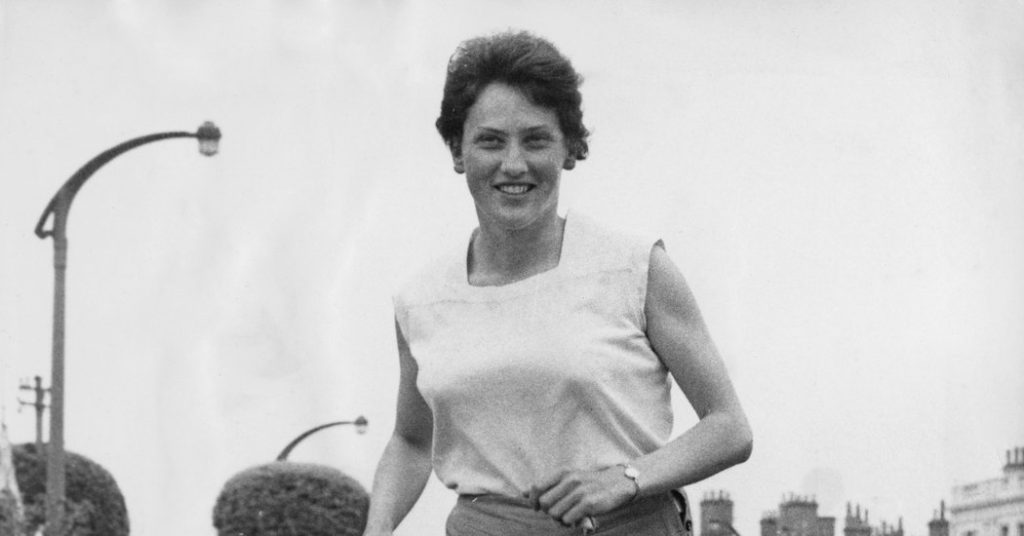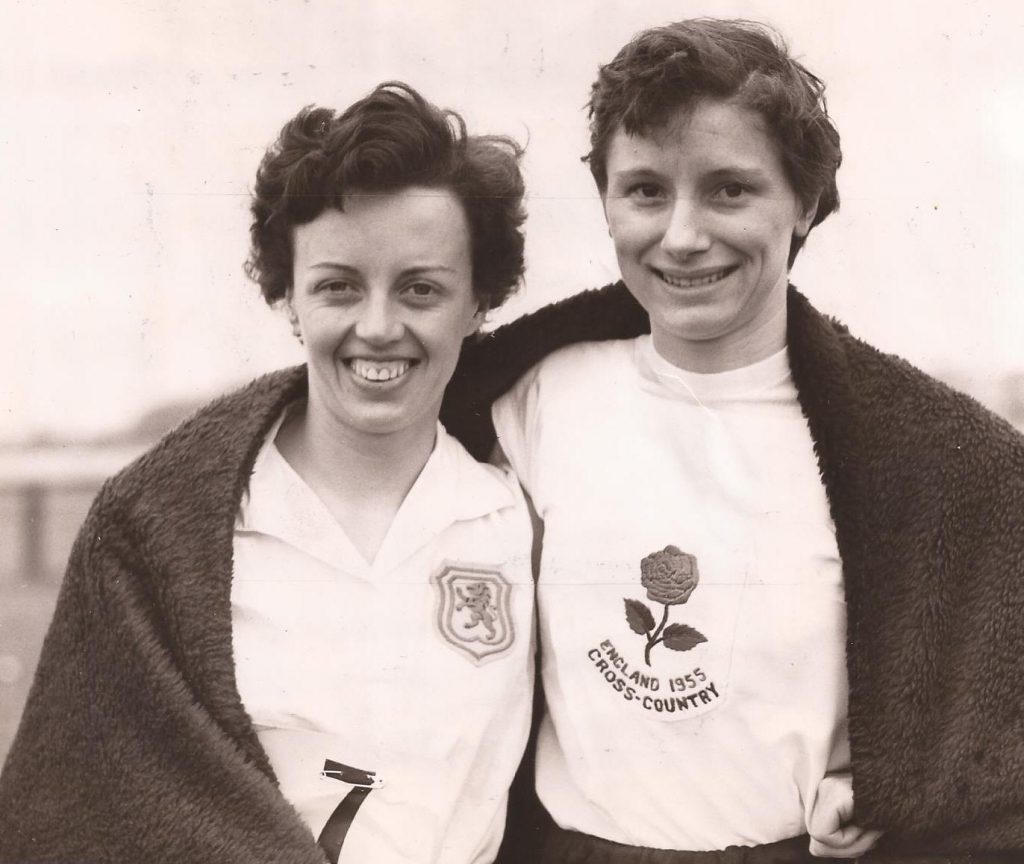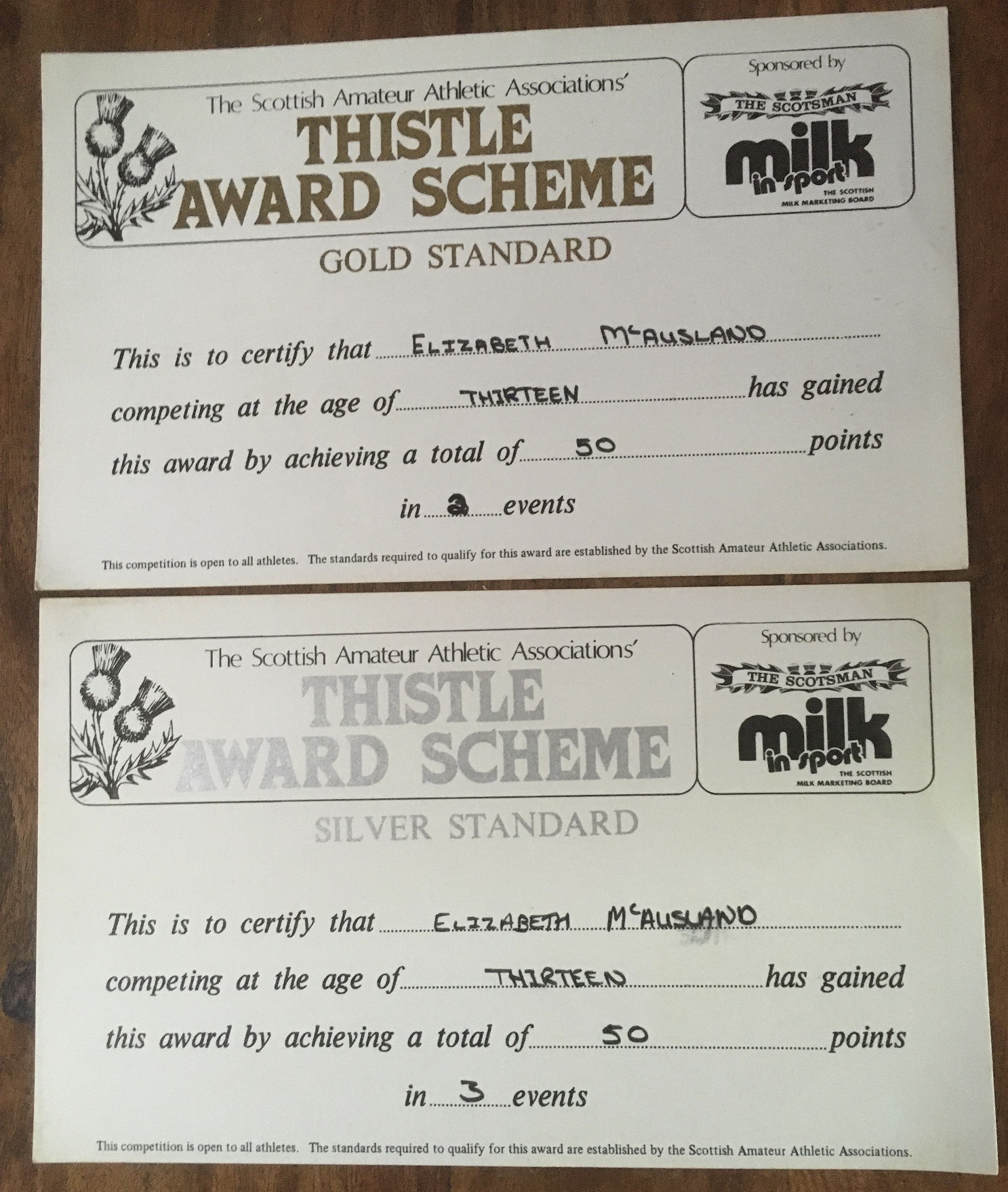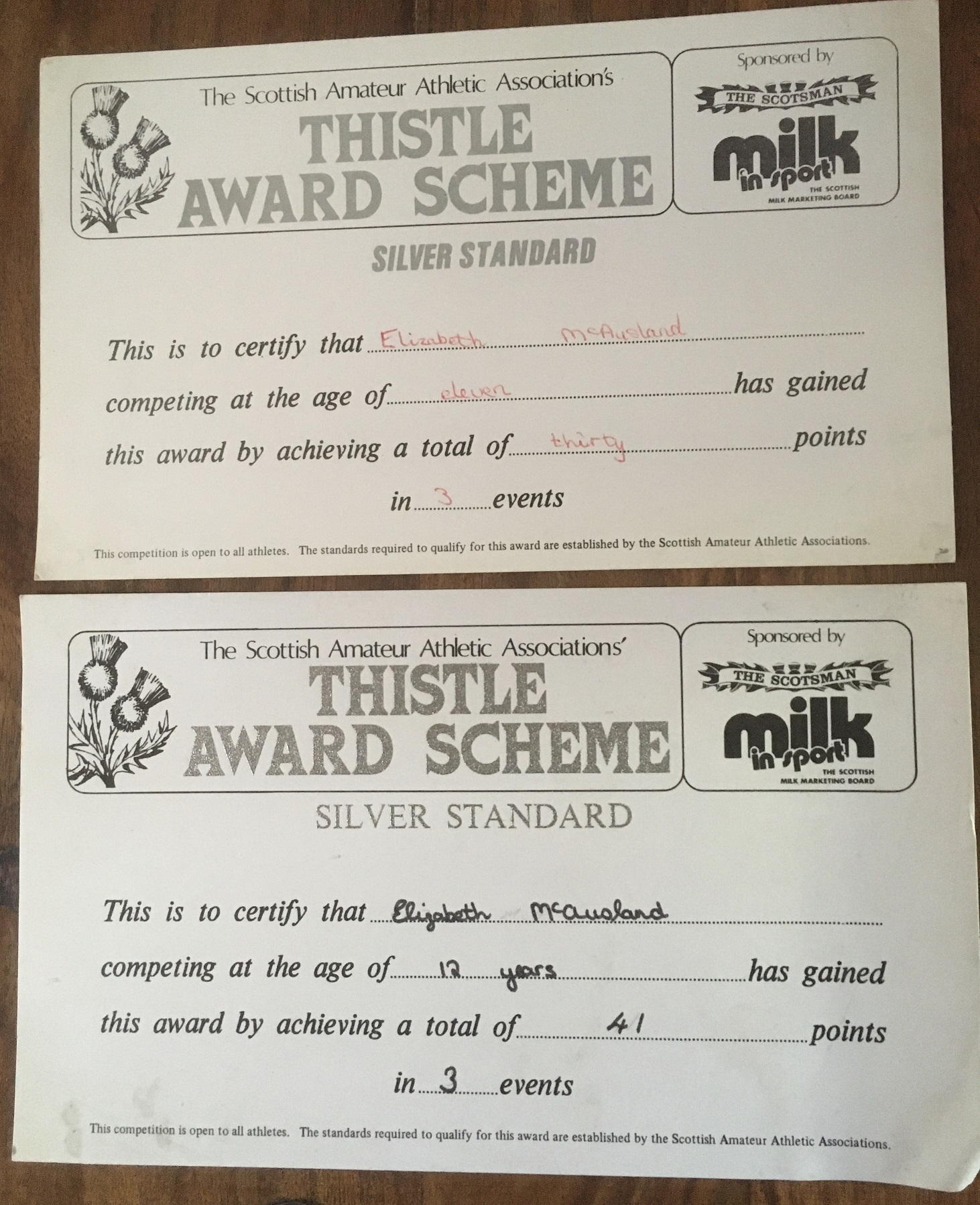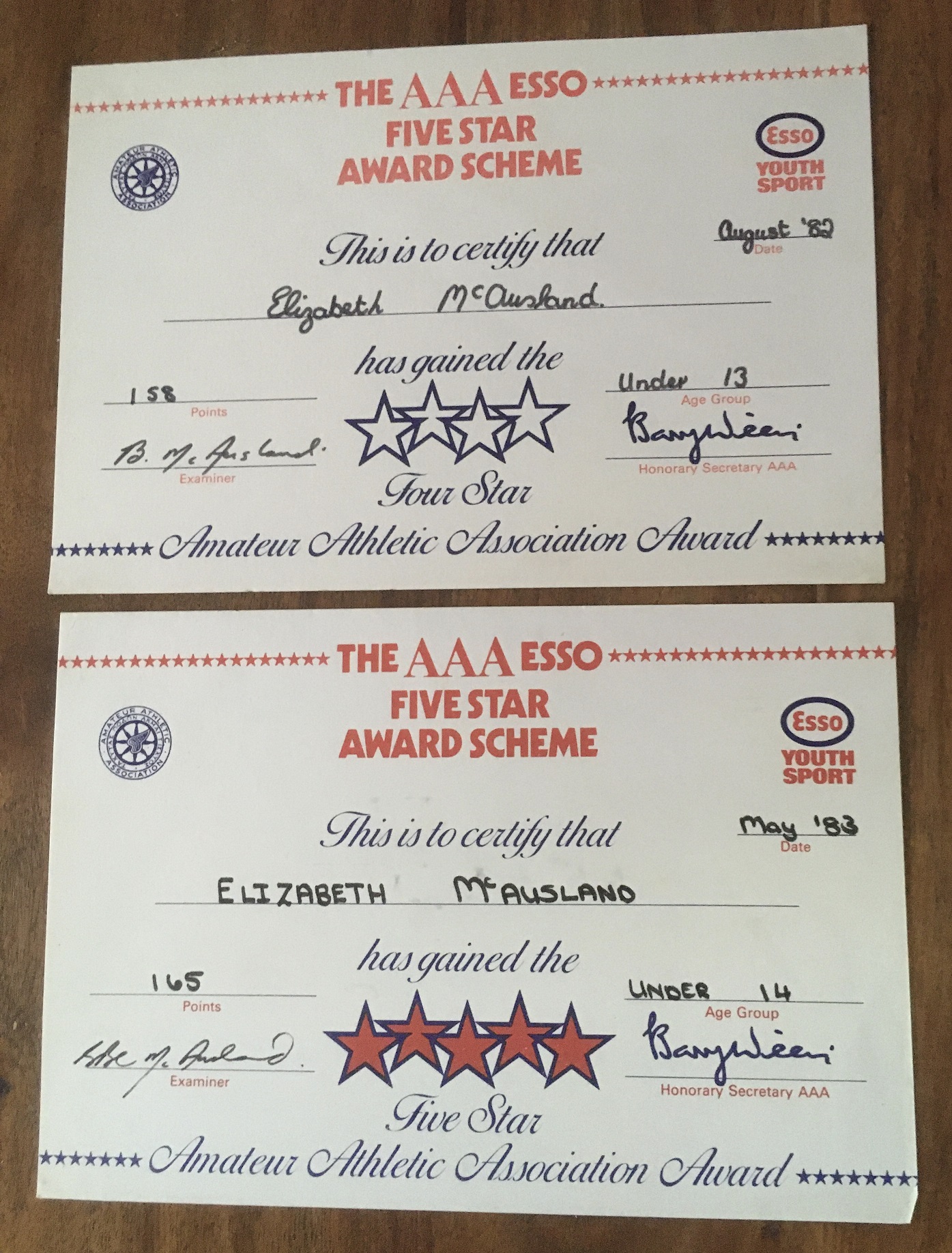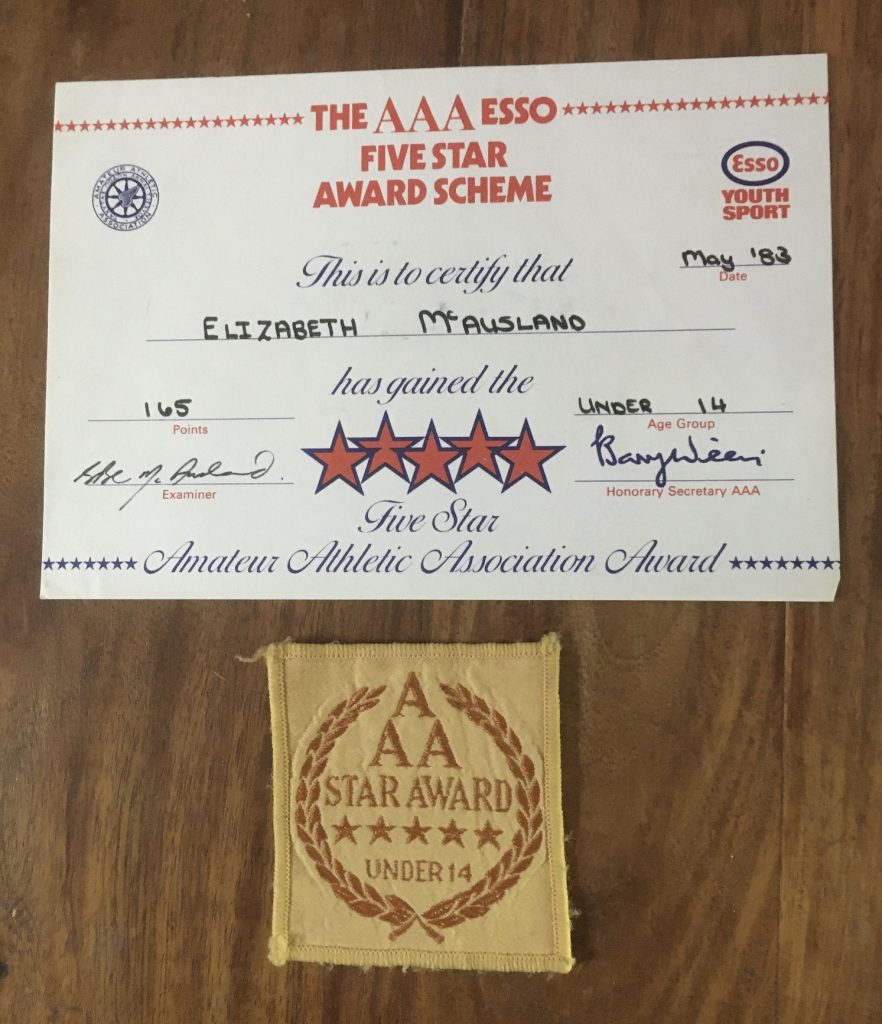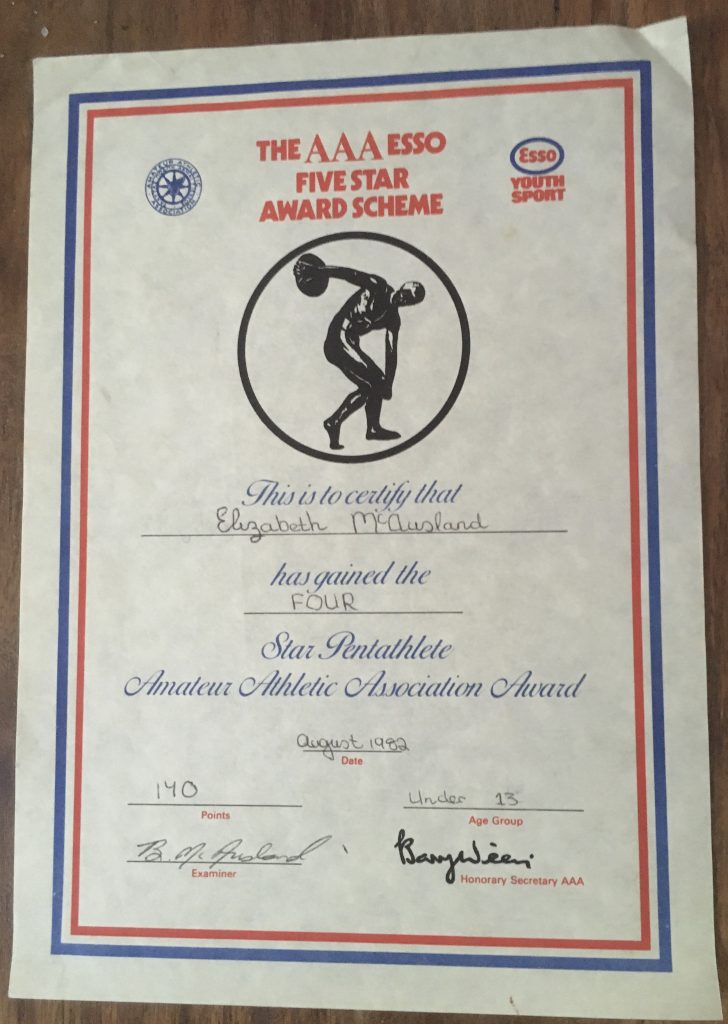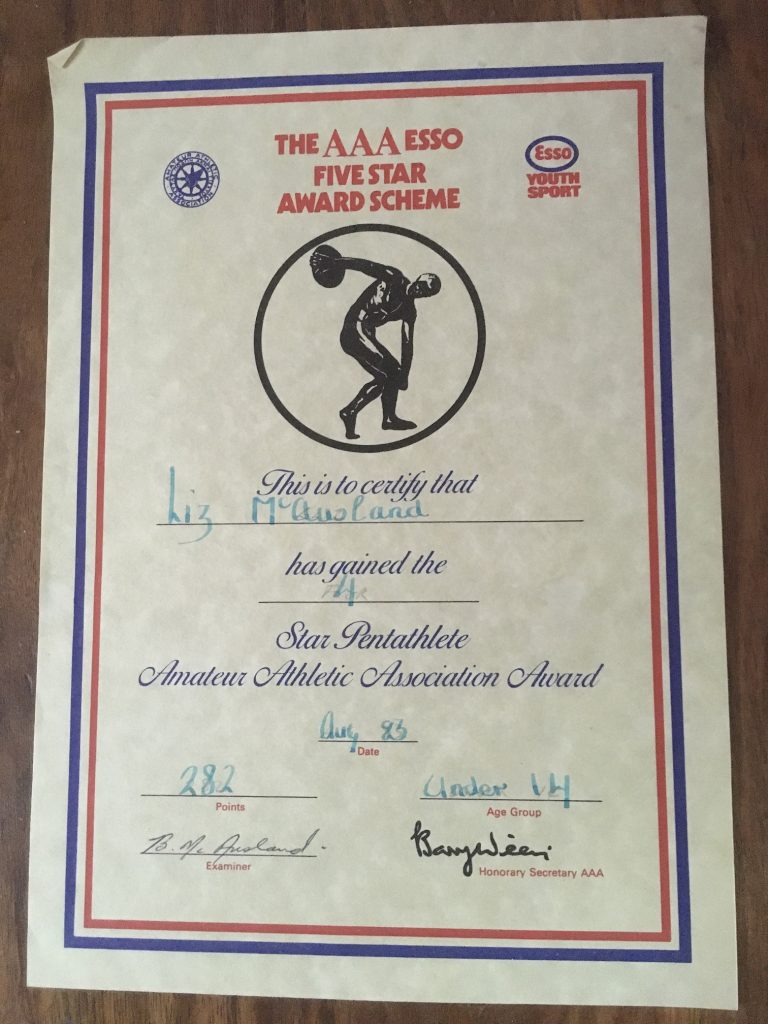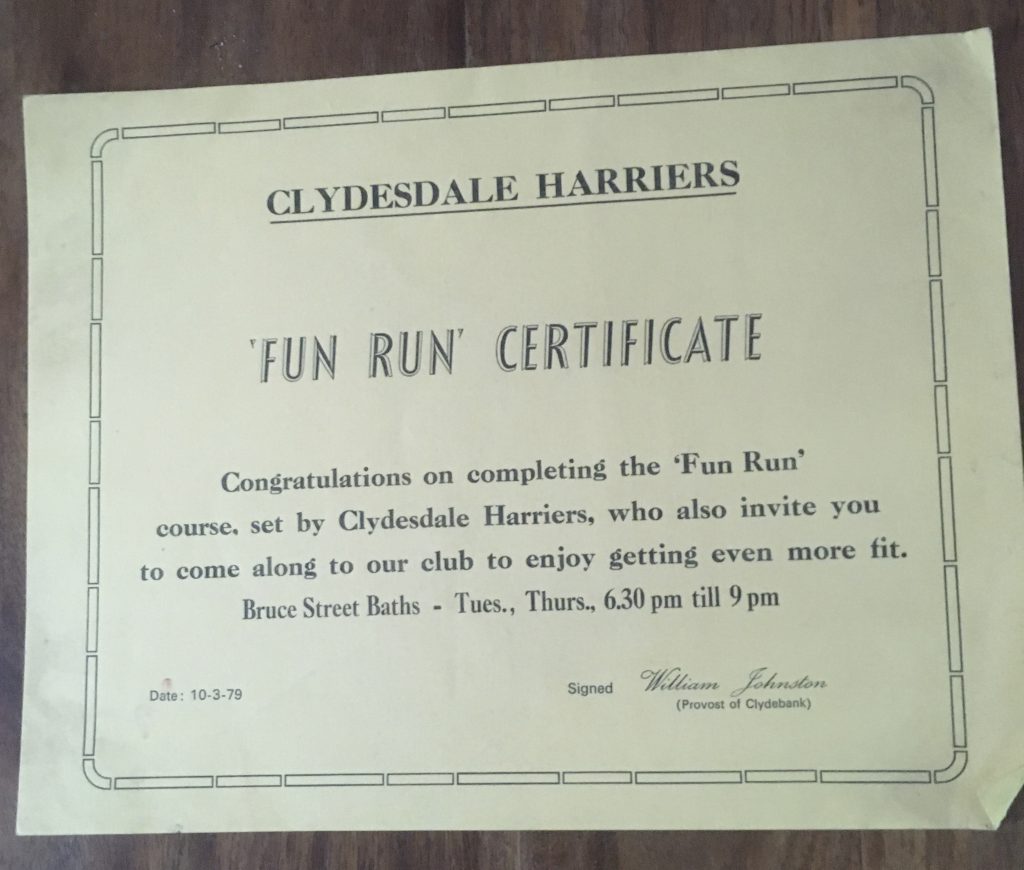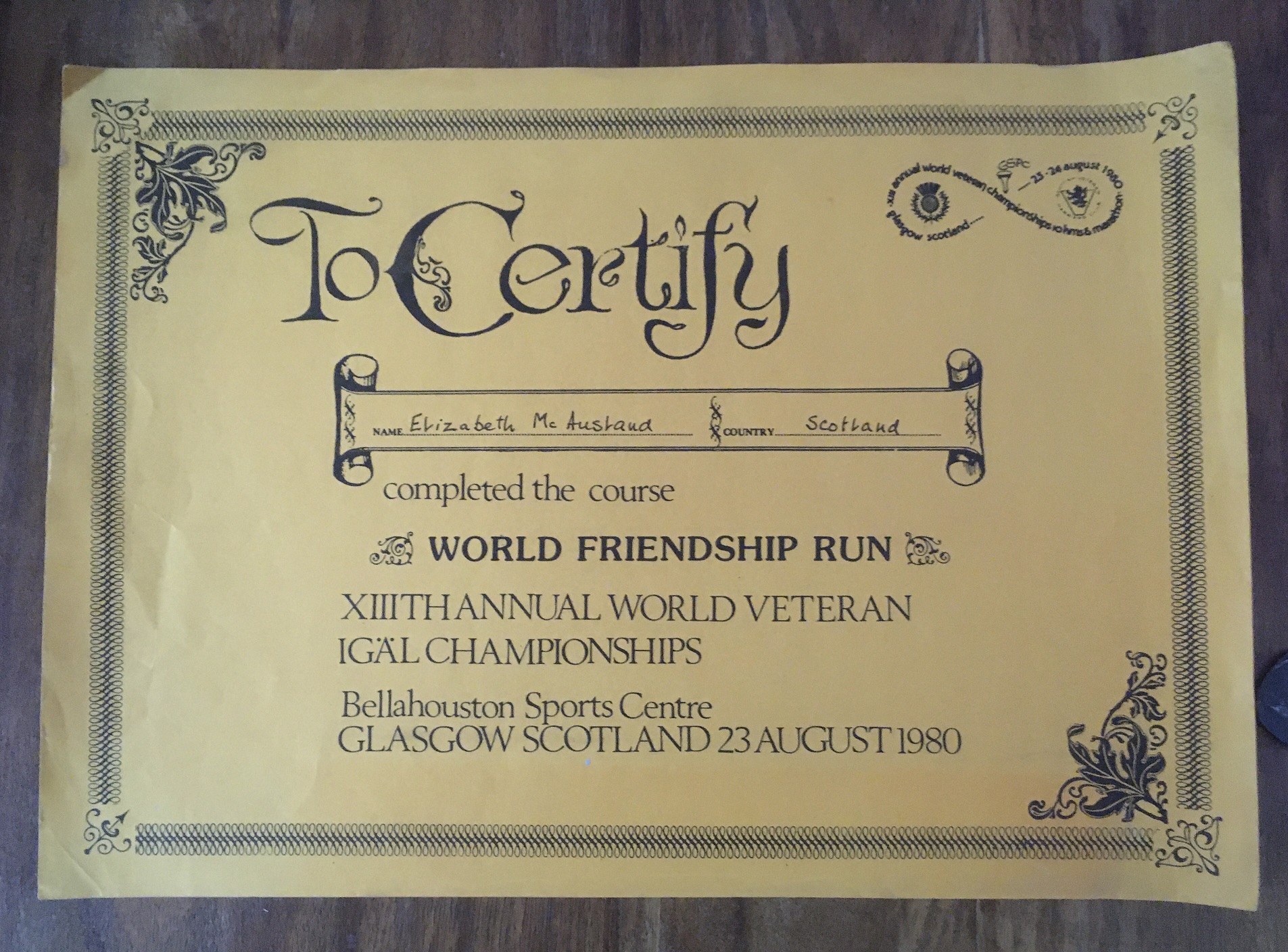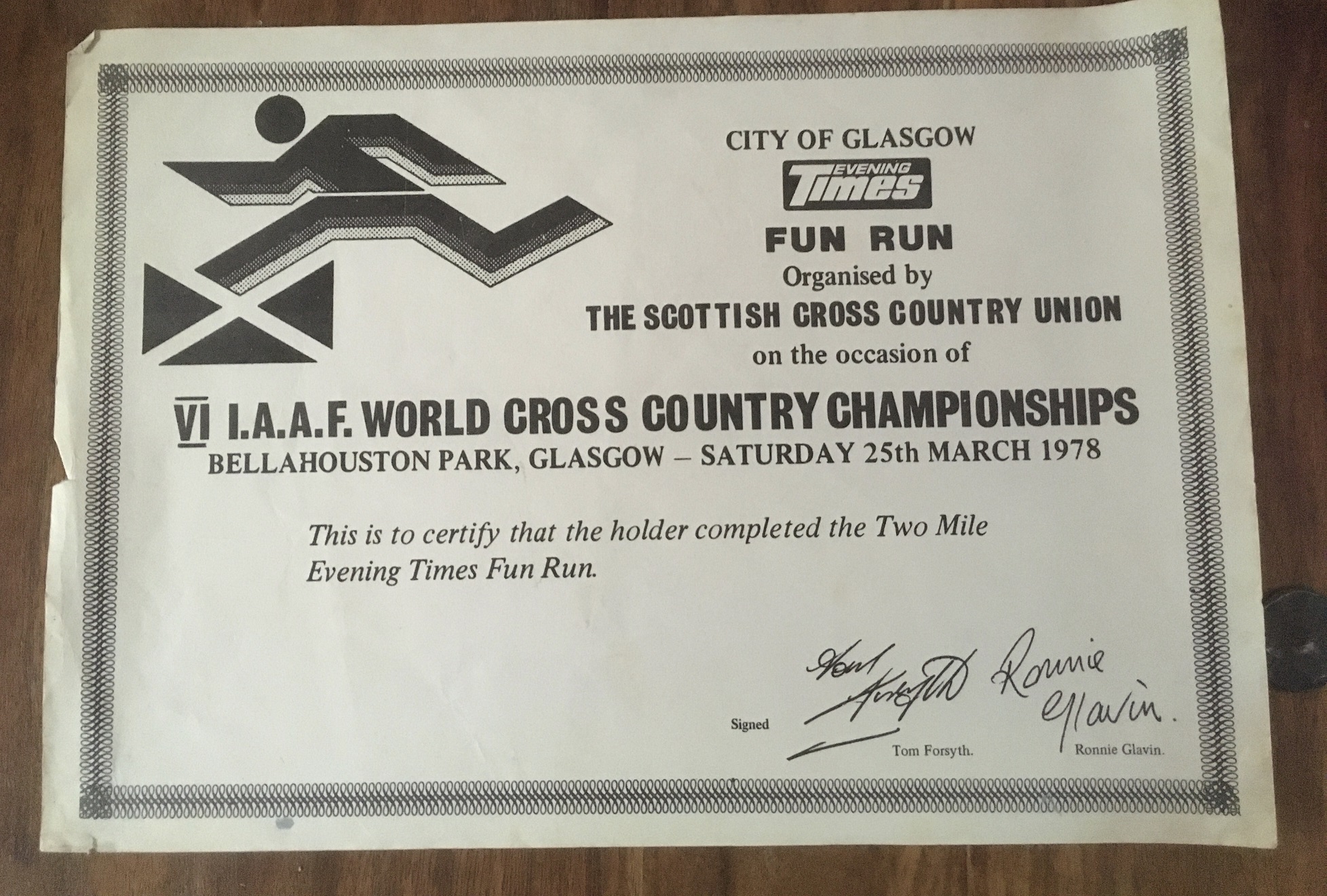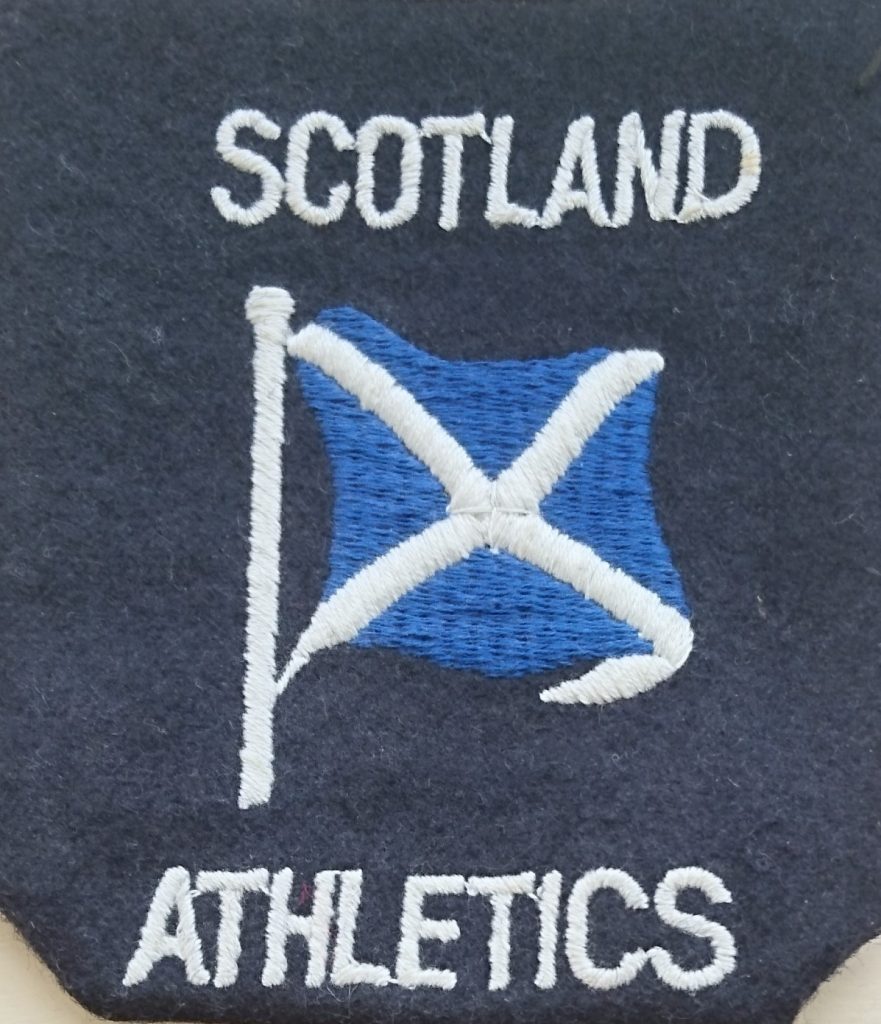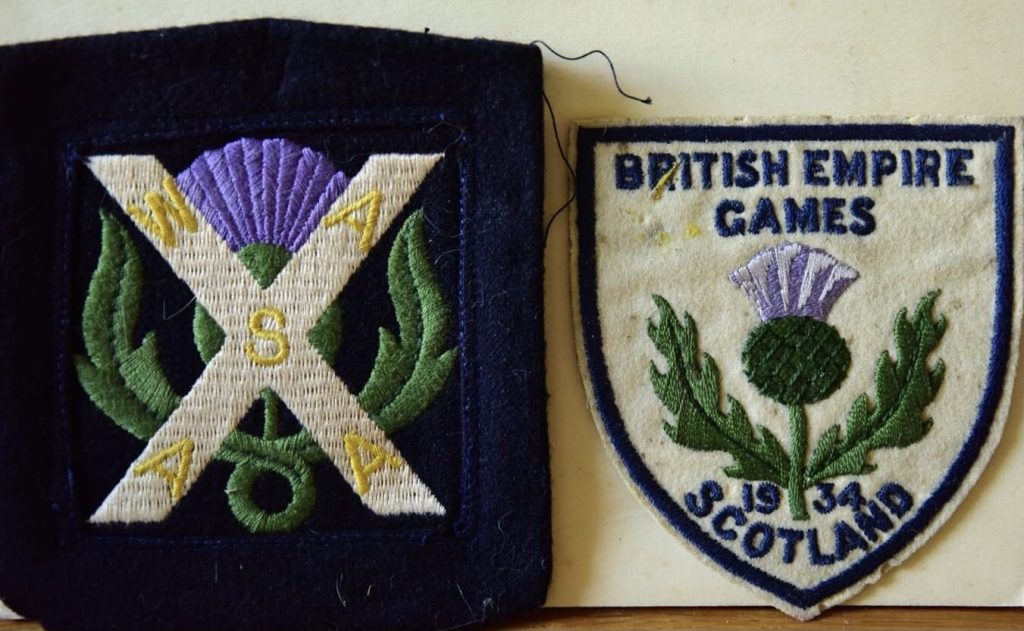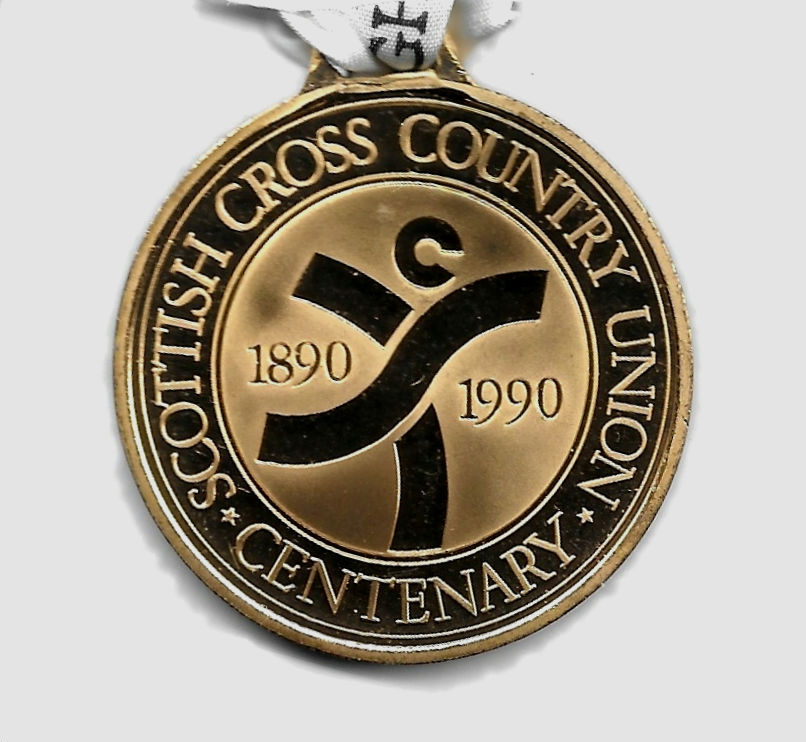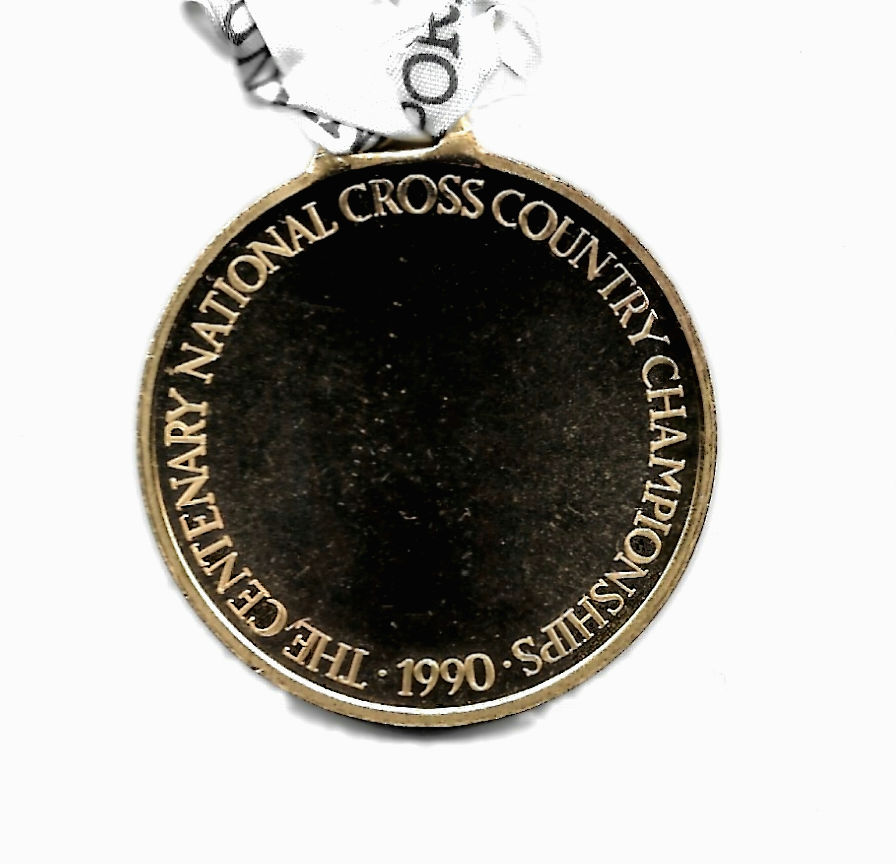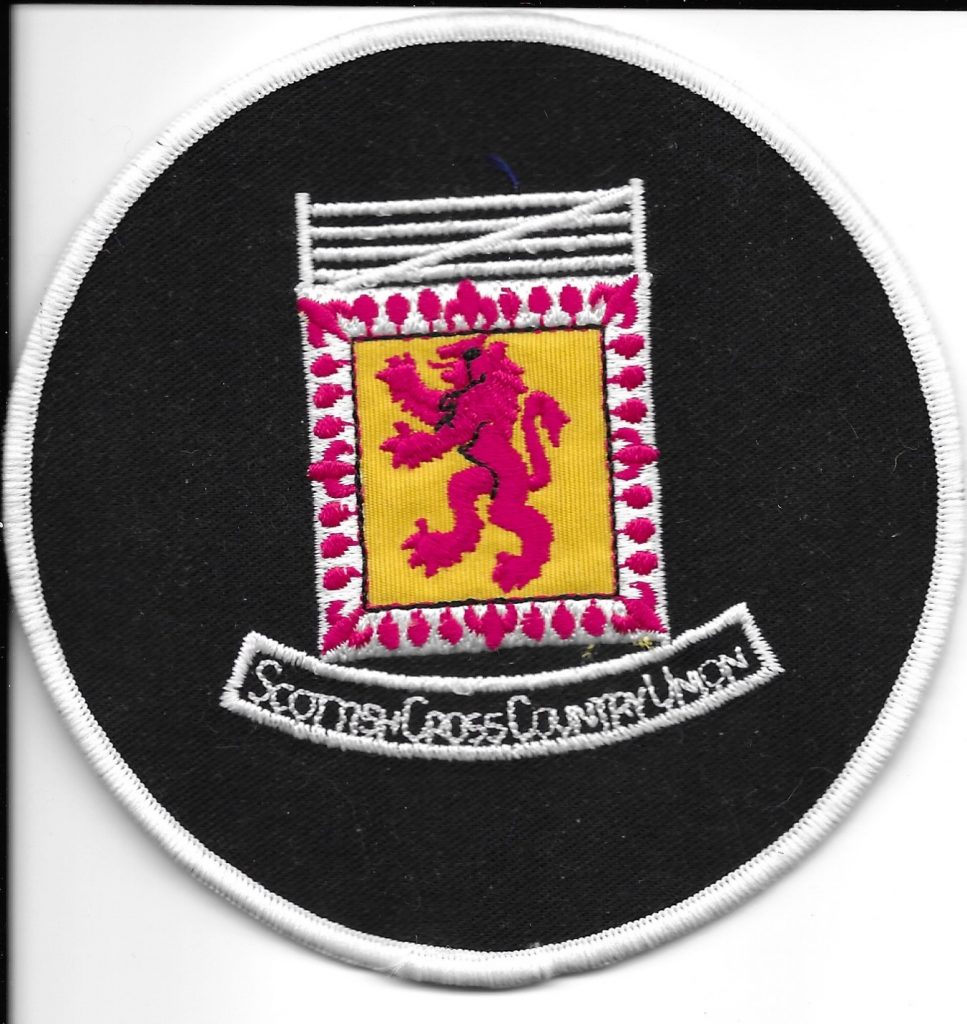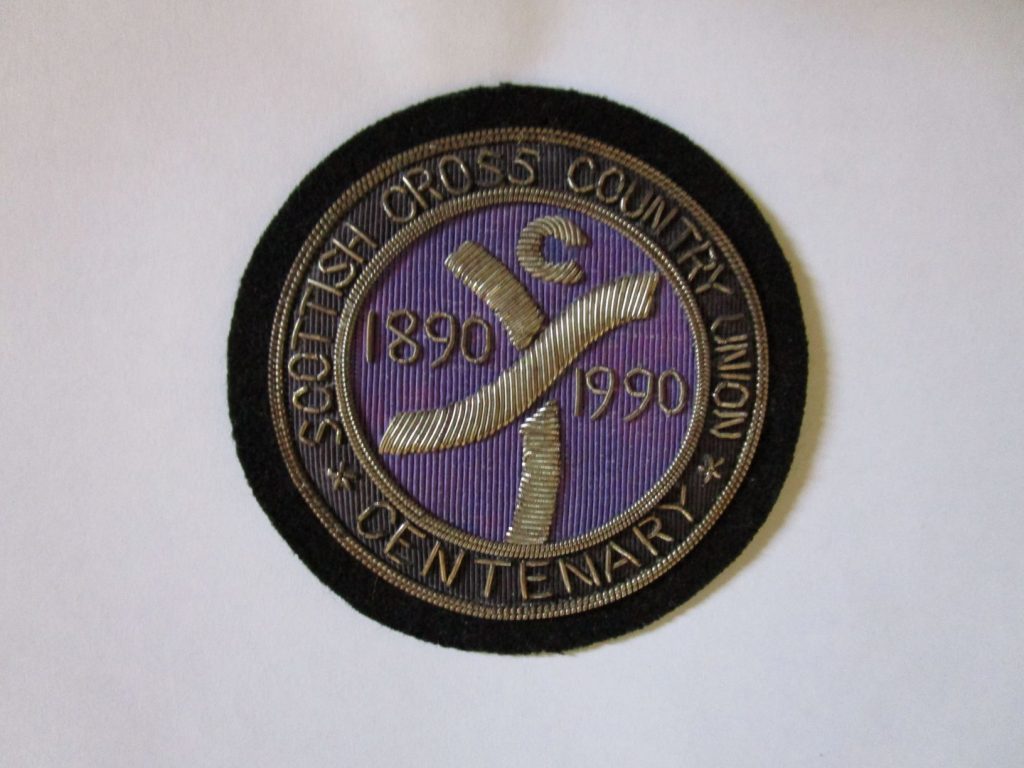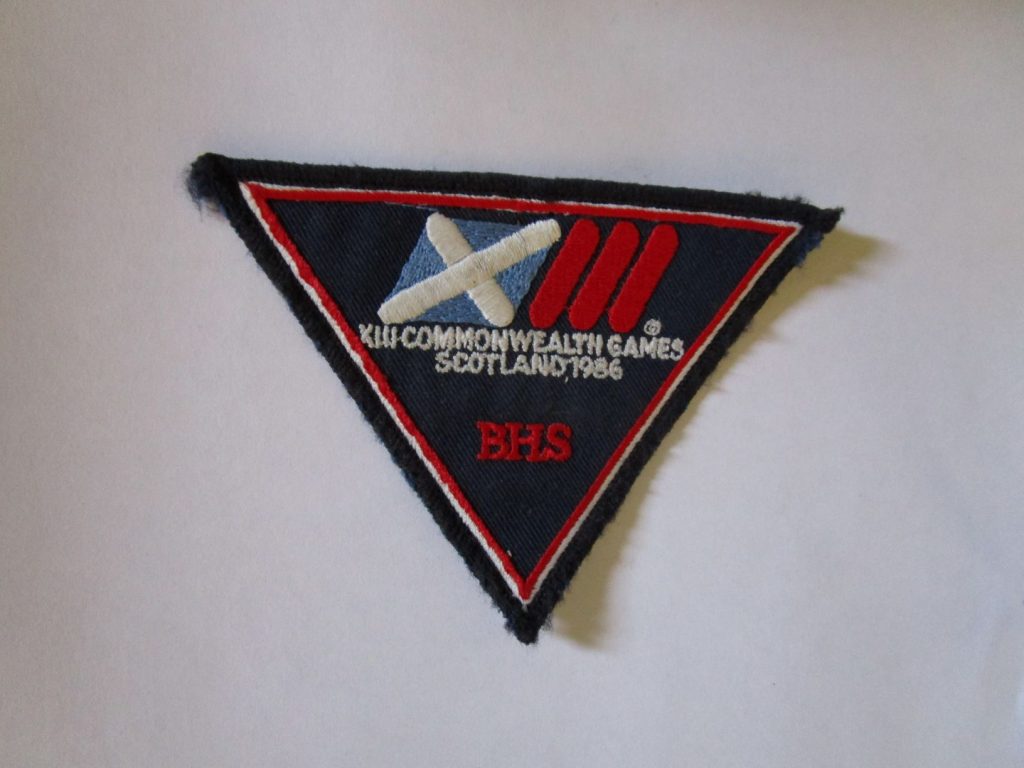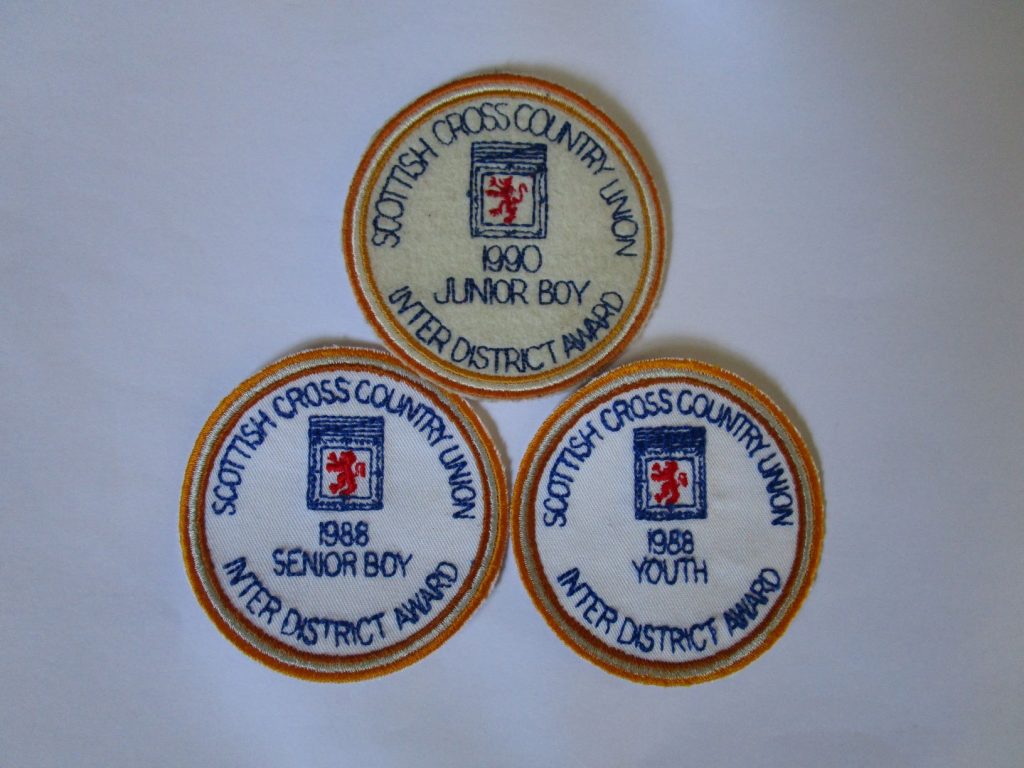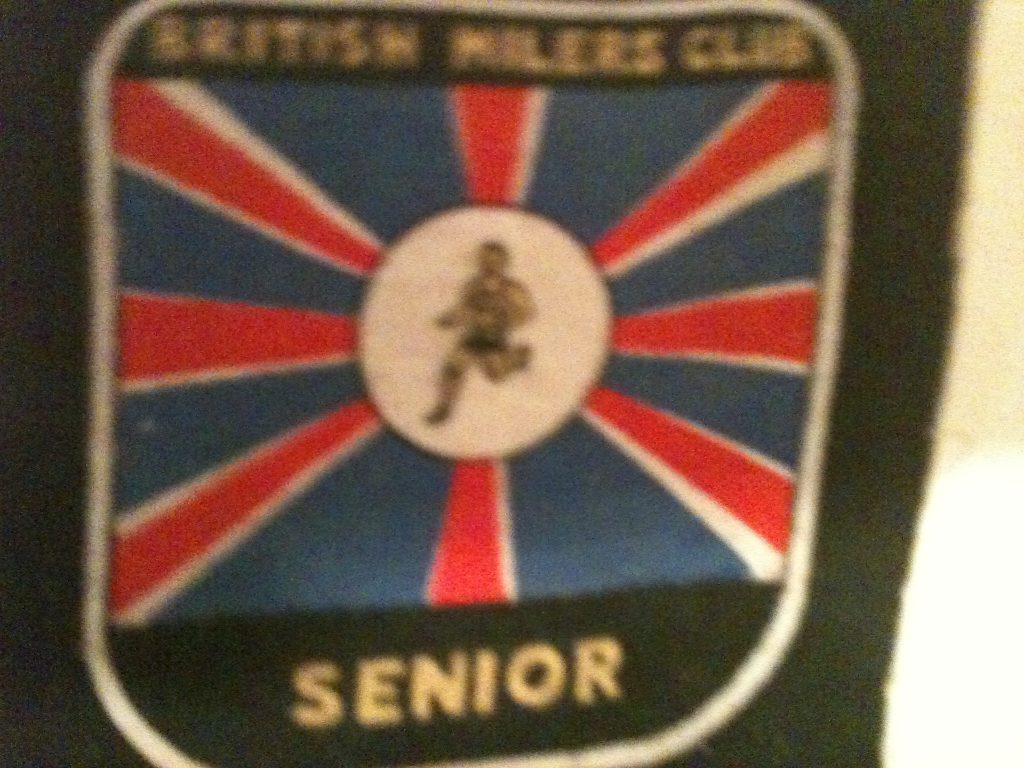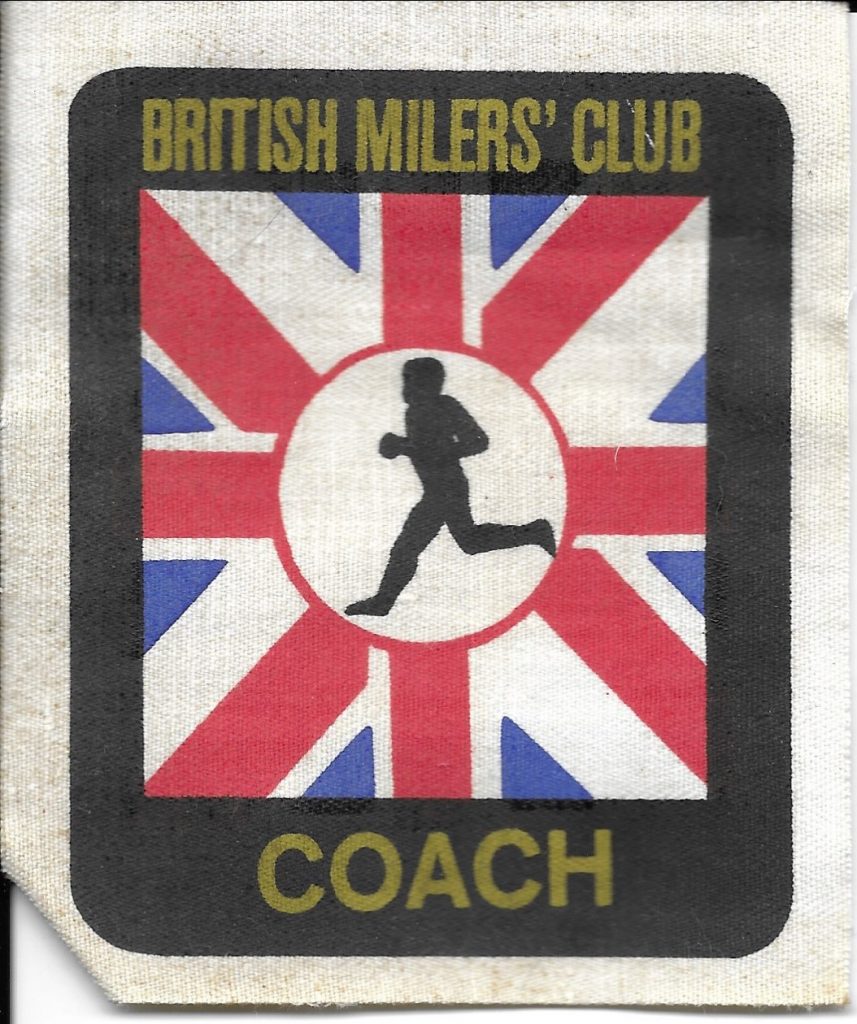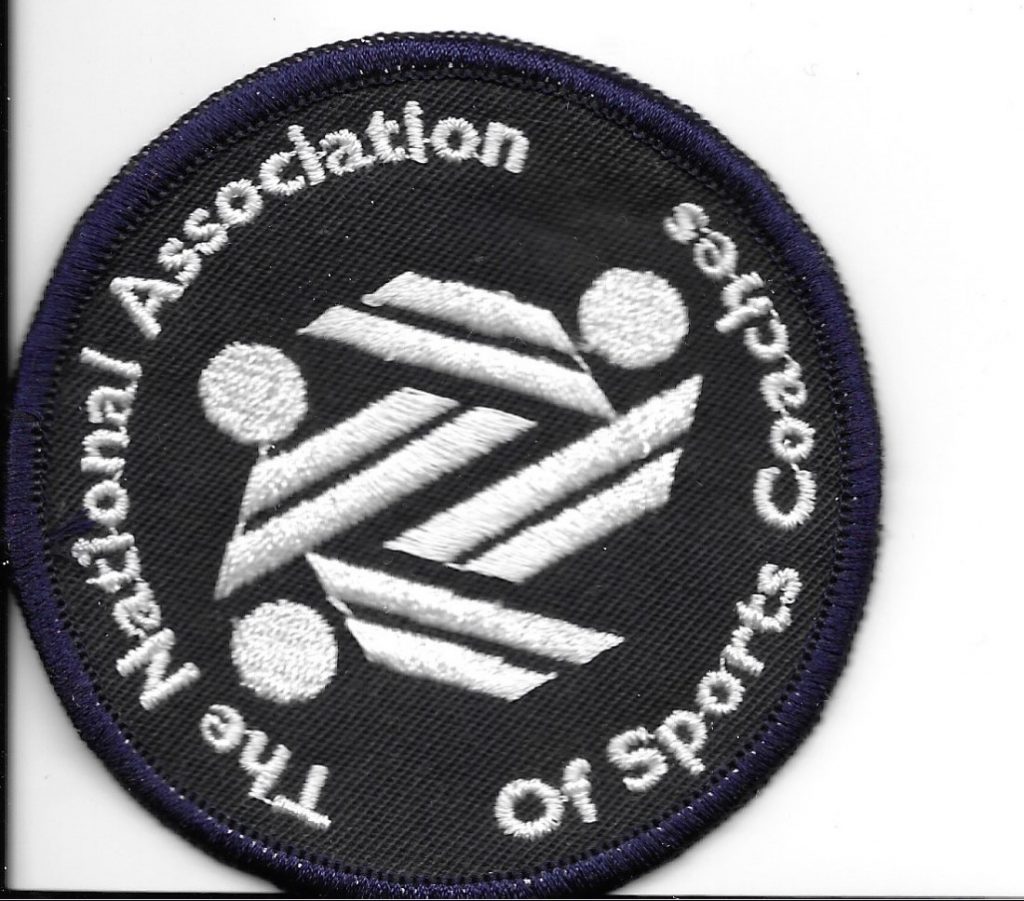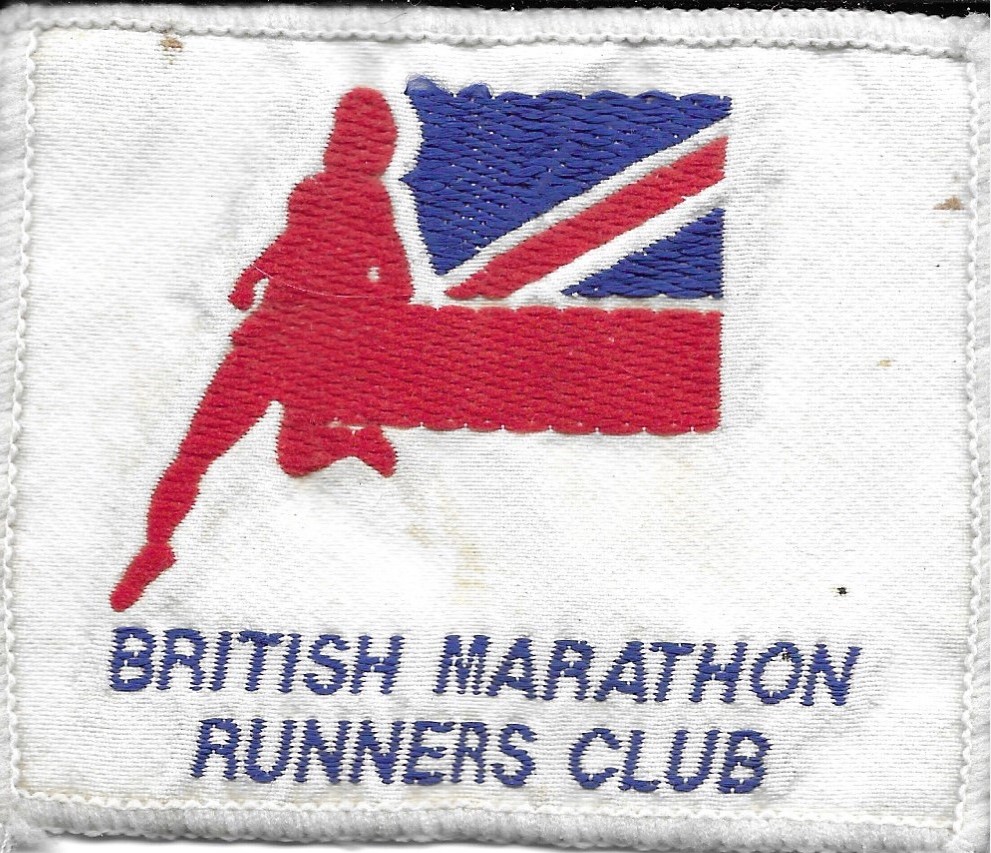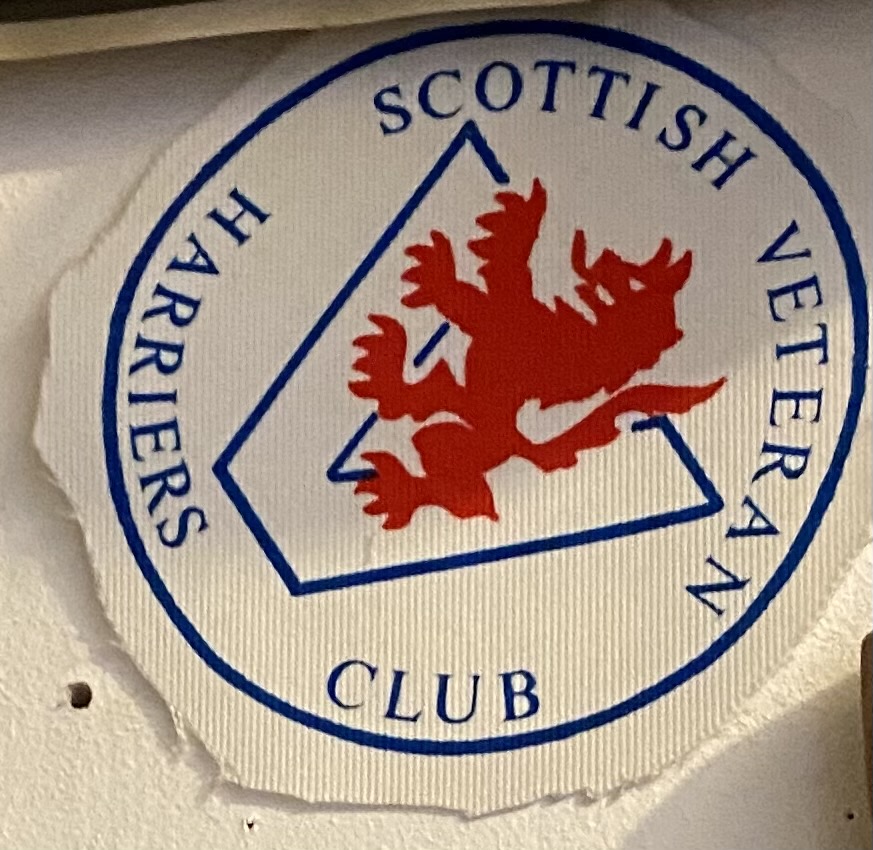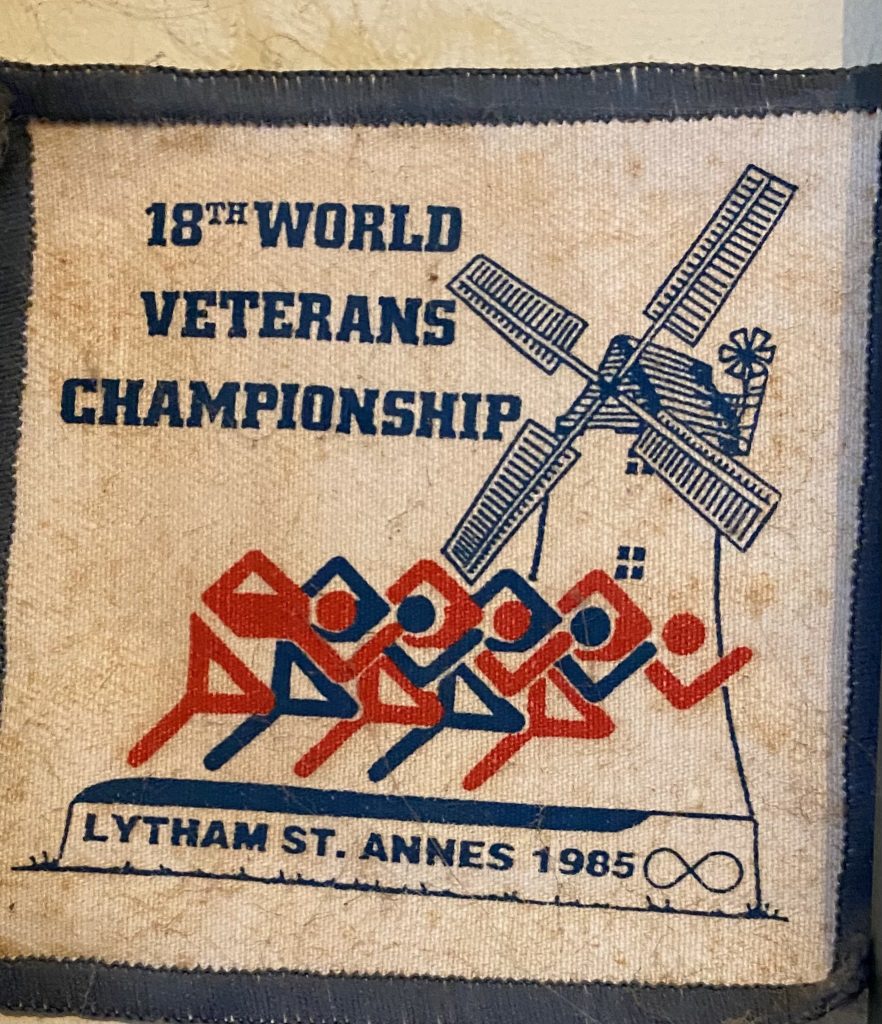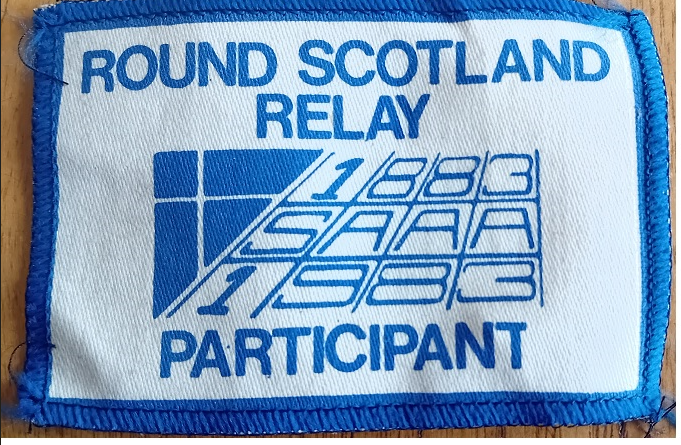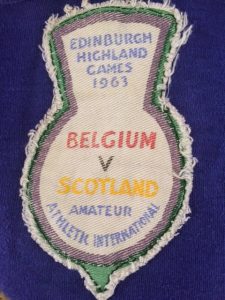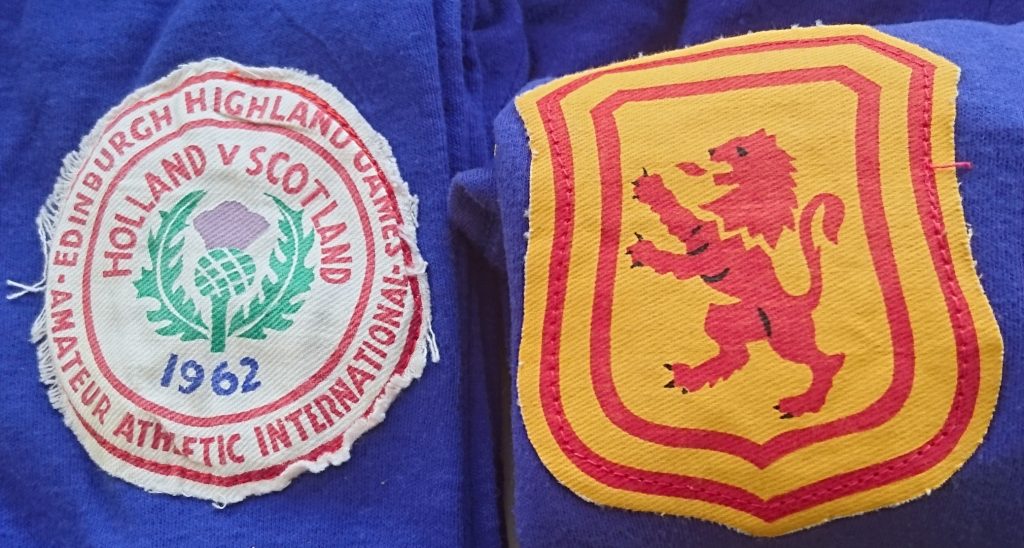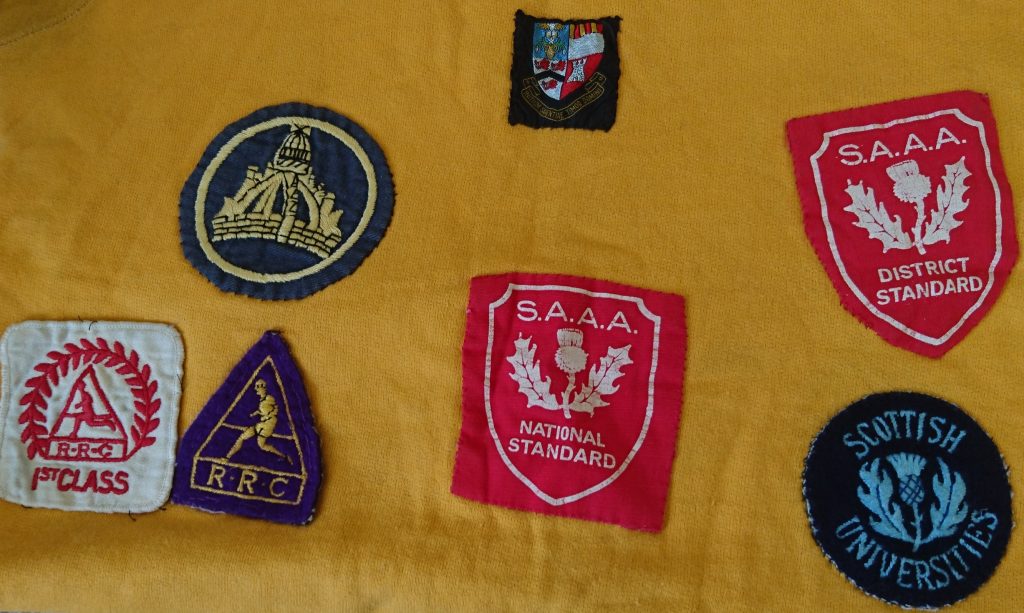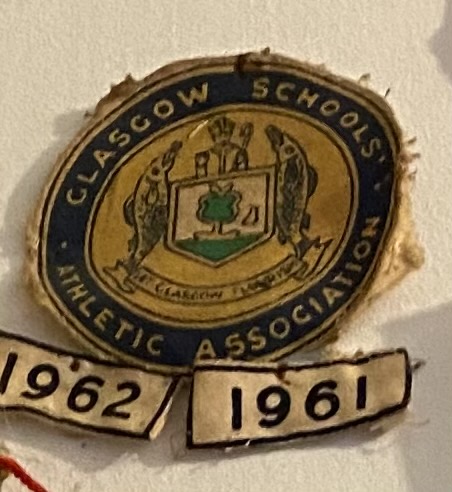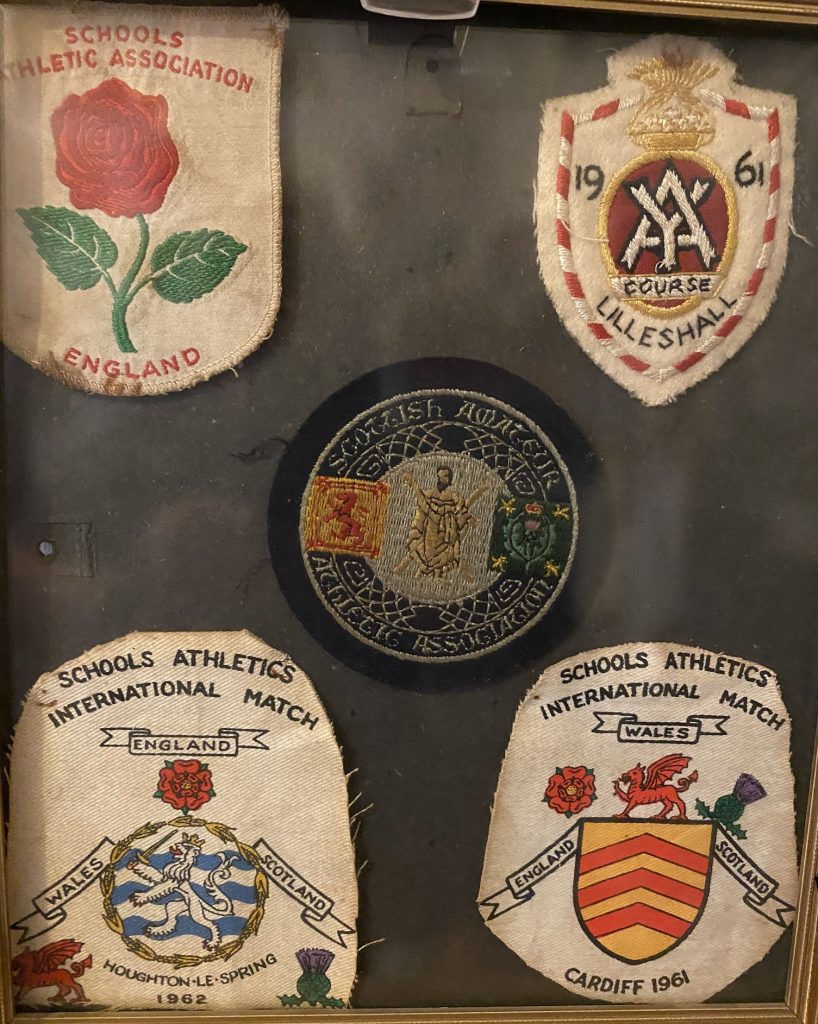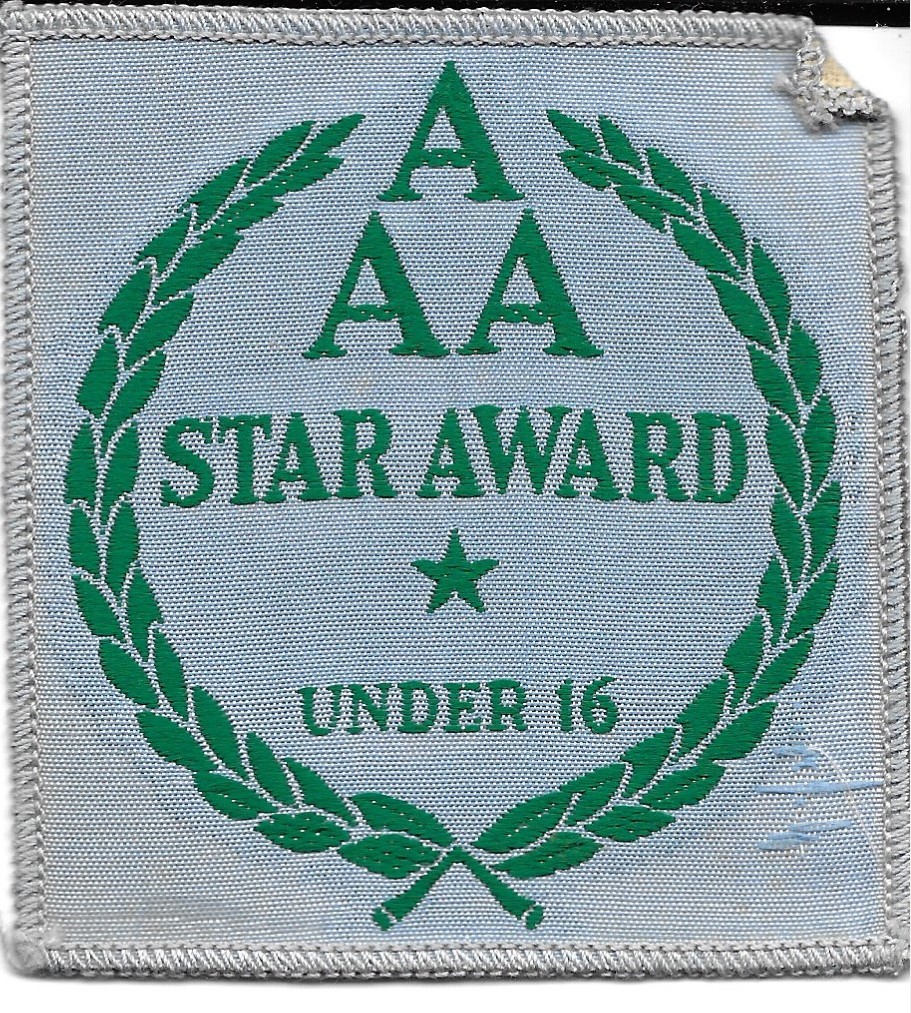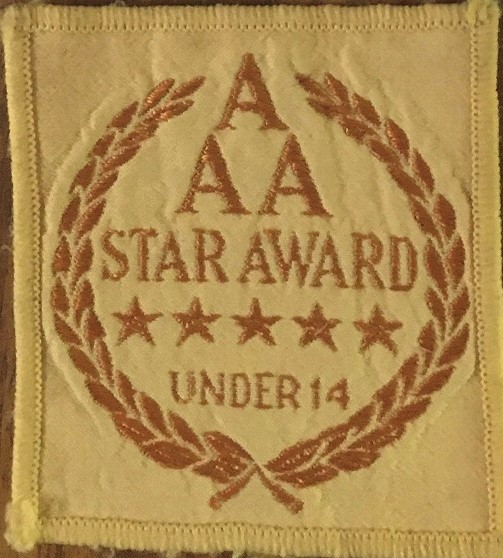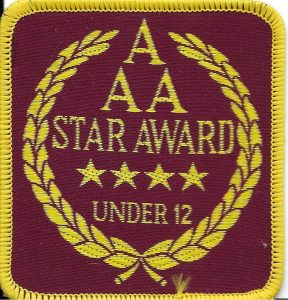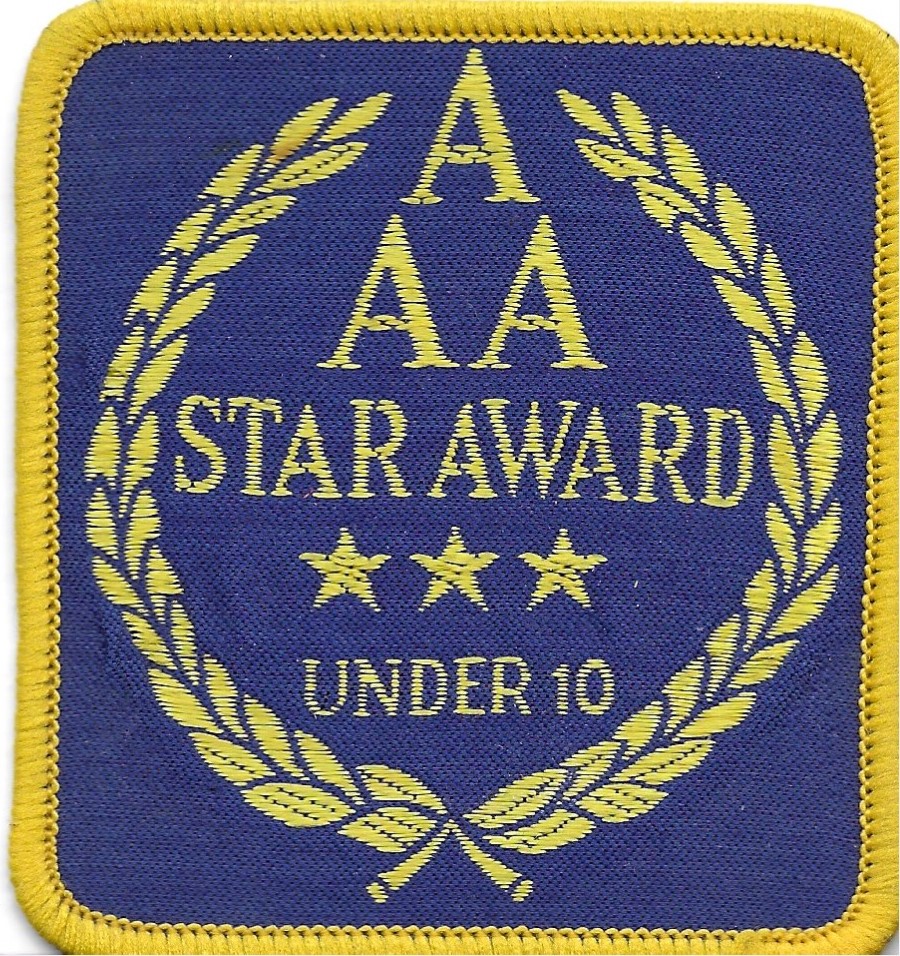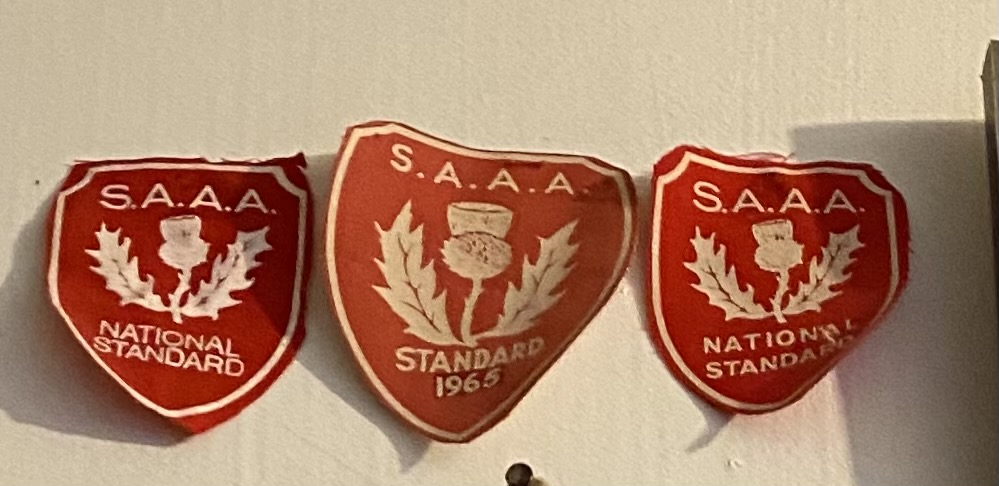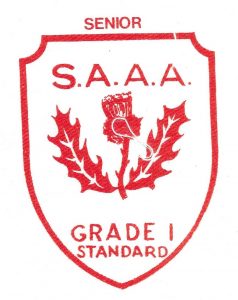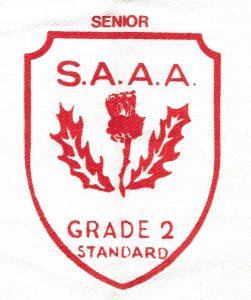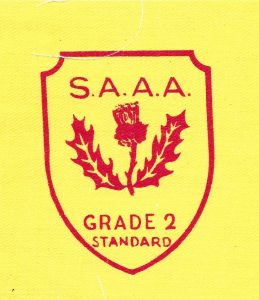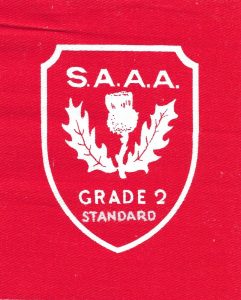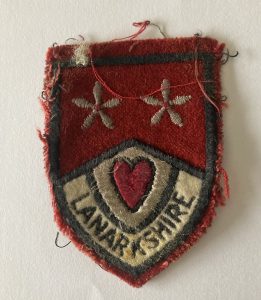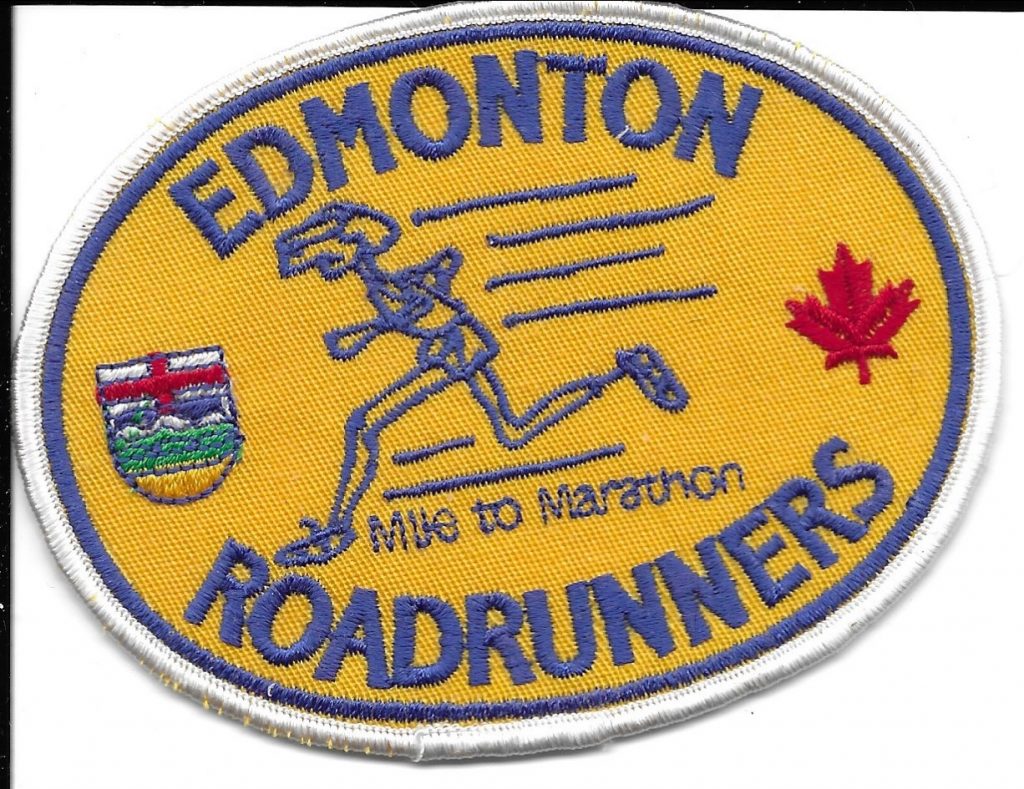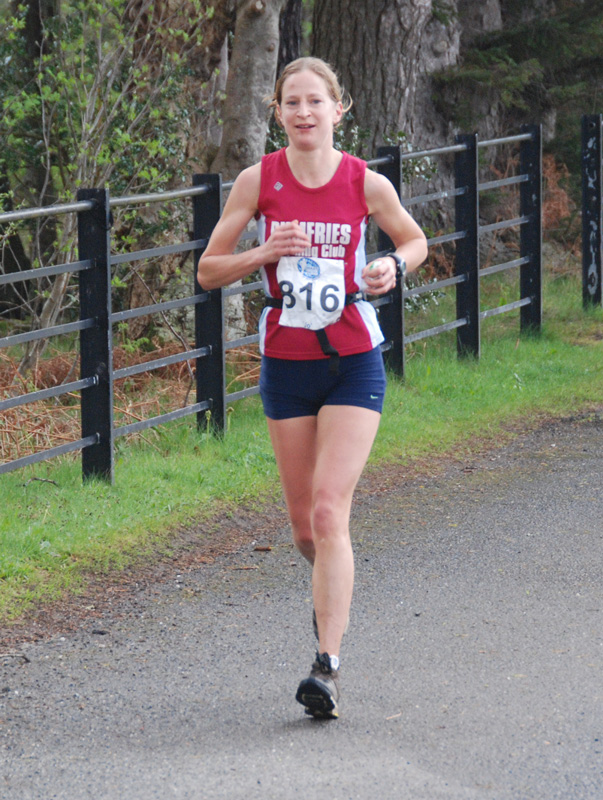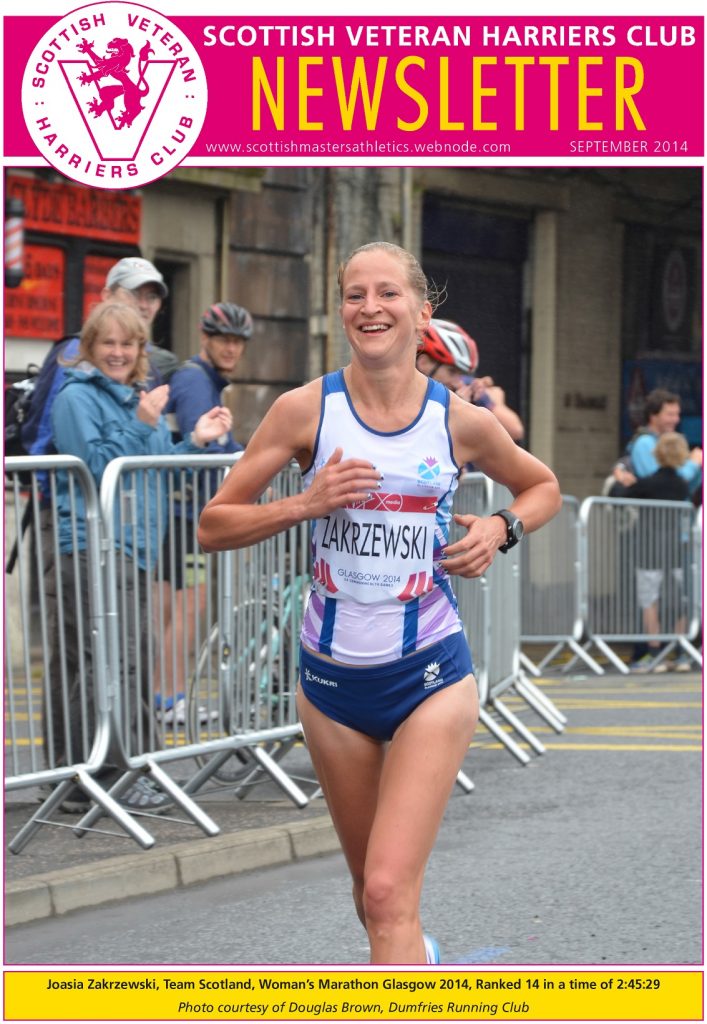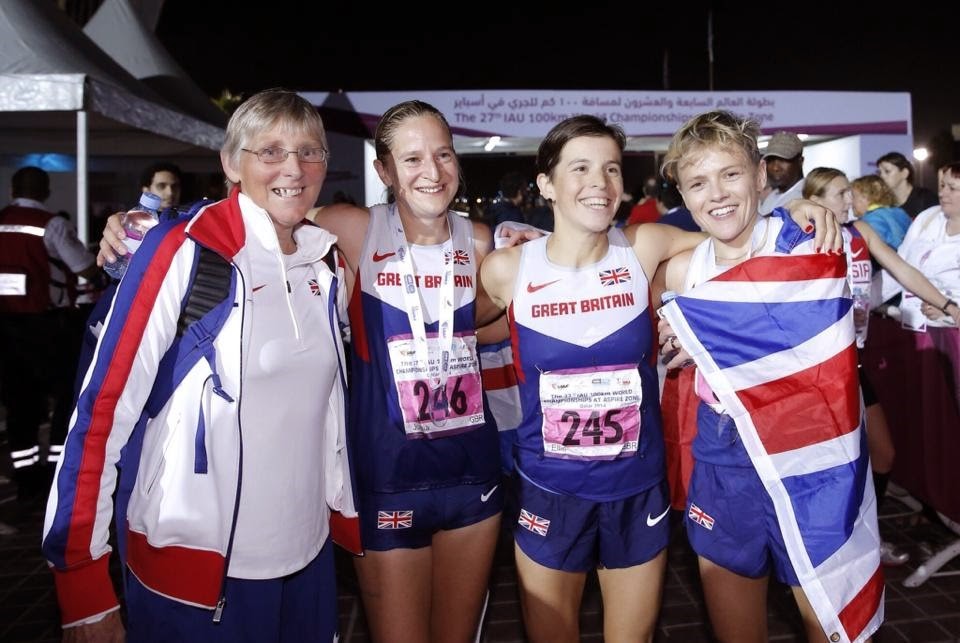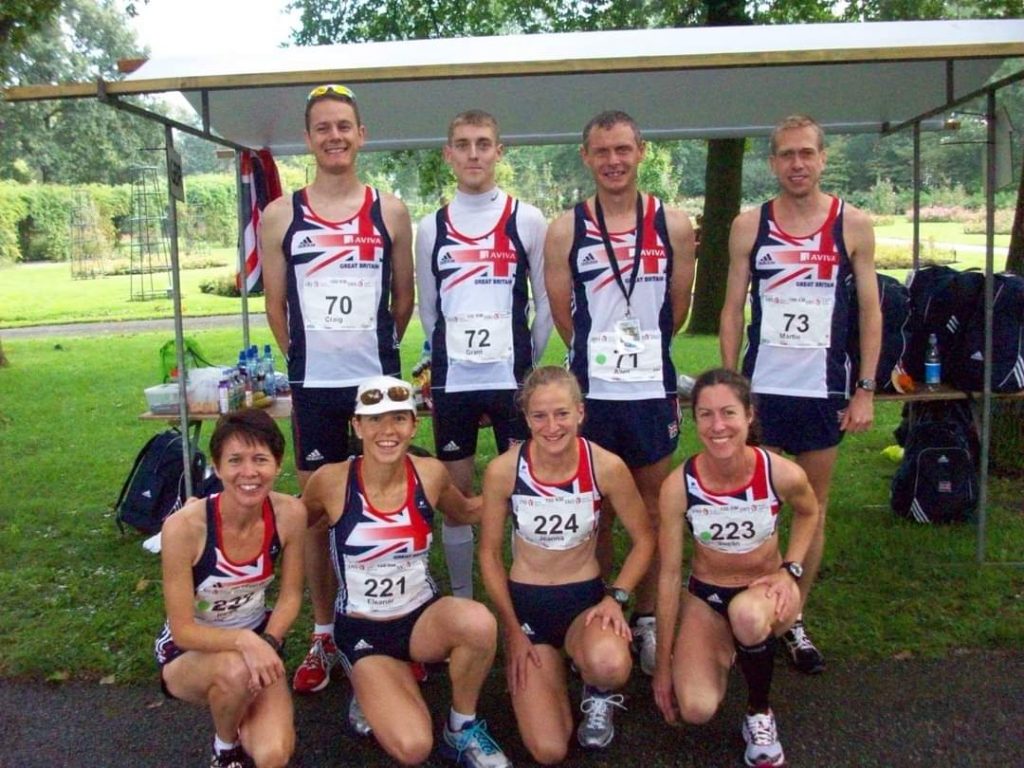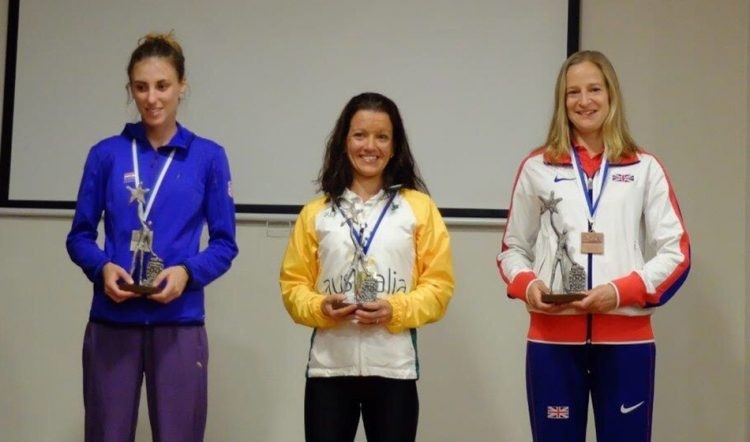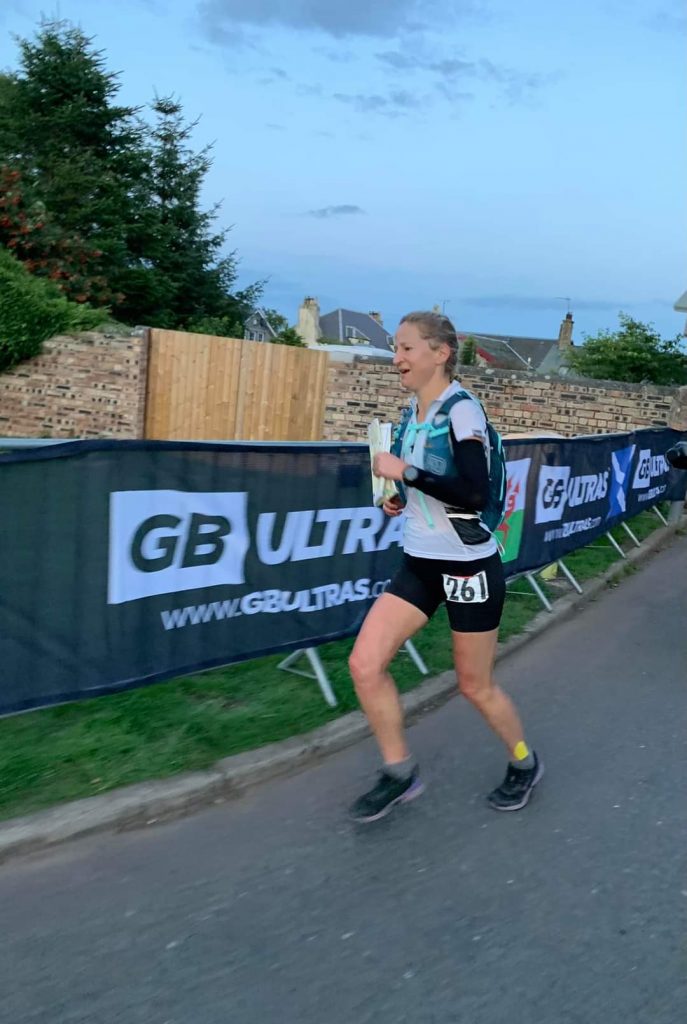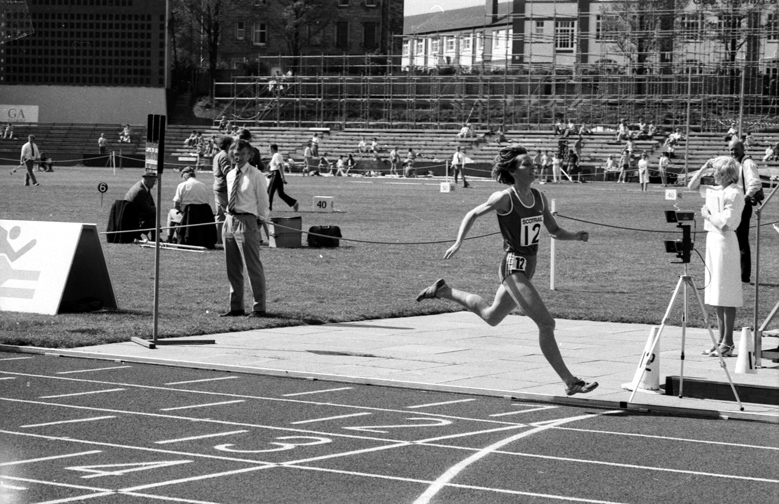
Lynne MacDougall
One of the questions in looking up anybody Scottish in a phone book, in a list of any sort come to that, is whether the surname is spelled Mc … or Mac… Indeed there are times when people change the spelling: I know of several who have gone through several decades spelling their name Mc .. who suddenly change to Mac. Then there are those who – however they spell the first part, switch from starting the second part with a lower case letter than the formerly favoured upper case. eg McDonald might become MacDonald or even Macdonald. This section will deal with both forms of Mac – all the Macs first, then all the Mcs. And we begin with
Kirsty R. MacCALLUM (4.11.65 Edinburgh Southern Harriers) ran over distances between 1500m and 3000m in 1993 and 1994 with best times of 4:44.52 (1500), 5:13.12 (Mile) and 10:07.82 (3000m)
Gail MACDONALD (14.11.67 Glasgow) was second in the SWAAA 1500m championship in 1985 and had best track times of 800m – 2:10.21; 1500m – 4:26.21; 3000m – 90:29.4 and scored scored 2806 points for the Pentathlon. She was also a useful cross-country runner and part of medal winning teams.
Linsey MACDONALD (14.2.1964 Pitreavie AC) was best known as a brilliant young sprinter who ran for GB in the 1980 Olympic Games, finishing 8th in the 400m final; and winning a bronze medal as part of the 4x400m Relay team. Linsey also competed in European Championships and Commonwealth Games. She is included here, in a distance-running history because, later in her career she won three silver medals in Scottish Championships: two for 800m (1987-1988) and one for 800m Indoors (1990). Lynsey Macdonald also ran four International 800m races for Scotland. Surprisingly, Linsey raced one Junior International cross-country race in 1981. This took place at Mallusk, Northern Ireland. Linsey finished second Scot (behind Liz Lynch (McColgan) but in front of Yvonne Murray) and Scotland lost to England but beat Wales, Northern Ireland and Ireland.
Deborah MACDONALD, (Lasswade AAC, Hunters Bog Trotters) is a good runner who has run well on all surfaces including in the hills where she was third in the Scottish Hill Running Championships in 1996. The love of hill running and the outdoors has been taken further, as a sailor, in the Island Peaks Race in 2009. She is also a regular cross-country runner for both her clubs running in East League races, National Championships and relay championships. Karen MacLeod’s sister, she says she never did any training but loved ot race frequently doing three races in a weekend and, during the summer months, 5 or even 6 races a week.
On the roads she has run in the Lochaber Marathon several times where she was third in 2002 and 2005, as well as the Loch Ness Marathon.. Deborah has run in road races from One Mile to Marathon with best times of 43:39 (10K), 95:16 (half marathon) and 3:20:51 for the marathon. and competed in the HEBS 3 Challenge where she won the event in 2001 and 2007. The HEB 3 Challenge is to complete at least three of the Hebridean Island Half Marathons – Stornoway, Benbecula. Skye, Barra or Harris in any one year. She ran for Scotland when a member of Lasswade, running in the Inter-Counties in Birmingham.
Sheena MACDONALD (20.11.72 Irvine) was another good middle distance runner who was twice ranked in the annual Scottish ratings – in 1989 over 1500m with a time of 4:41.73, and in 1990 with 10:29.7 for 3000m.
Lynne MACDOUGALL (18.02.65, Kings Park School, Glasgow, City of Glasgow) Lynne MacDougall is a superb athlete by any measure. She has run in an Olympic final, European Championships, Commonwealth Games and won British and Scottish championships. Over the country she has won Scottish cross-country championships at Under 13, U15, U17 and Senior levels. There was no Under 20 championship for her to contest at the appropriate time. You really must read her full profile at this link. .
Heather K. MACDUFF, (17.05.58 Edinburgh was a very good Marathon runner at a time (1980’s) when marathon running in Scotland was at a very high standard. Her only championship medal was when she was third in the national championship in 1989. Her best time was 2:34:26 in 1988 when she was Scotland’s second fastest woman marathon runner. Still on the roads, Heather won the national half marathon championship in 1988 in 76:43. She also ran 36:42.96 for 10000m.
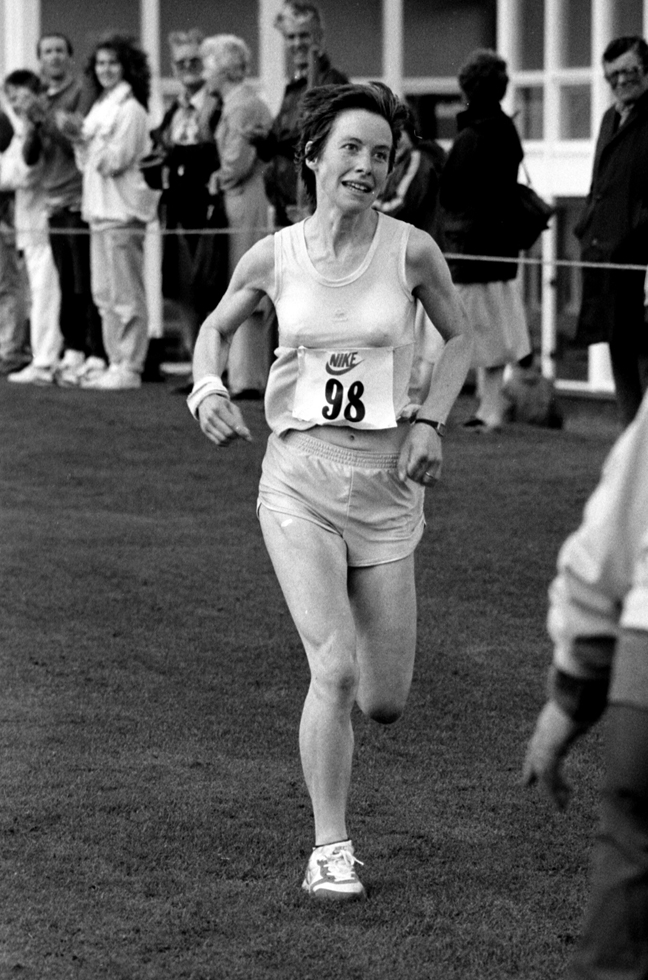
Heather MacDuff
Lynne McIntyre – see Lynne MacDougall (above)
Elaine Mackay – see Elaine Scally
Karen MACKAY (Cardinal Newman HS, Clyde Valley) Karen was a middle distance who appeared in the national ranking lists in both 1978 and 1979 with personal best times of 4:57.1 for 1500m and 10:55.42 for 3000m.
Rhona MacKAY, (7.08.62, Shrewsbury, Leicester Coritainian, Charnwood) (later MAKEPEACE) was a very good distance runner over all distances from 800m to 5000m between 1976 2002. As a competitor, she was third in the British 3000m in 1996, and third in the Scottish 1500m in the same year. Her best times for her distances were 800m – 2:07.1; 1500m – 4:14.2; 3000m – 9:03.12 and 5000 – 17:00.9.
Fiona MACKENZIE, (Pitreavie AAC) was only ranked for one year in Scottish athletics but it was a very good year. Second in the SWAAA indoor 1500m in 1975, she ran 2L21.8 for 800m and 4:58.9 for 1500m. It should be noted that as an U13, she won the ECCU U13 Cross- Country Championship at Rawtenstall , Lancs in 1973 , possibly the first Scot to have achieved that. And as an U20 she ran a 4:52.3 1500m at Coatbridge in Aug ’79 and a 2:17.2 also at Coatbridge in April ’80.
Katrina MACKIE (Bathgate) ran in 1968 and 1969 and recorded bests of 5:27.1 for the Mile and 2:27.1 for 880 yds.
Morag MacLarty (10.02.86 Central AC) later Millar. A first class athlete – read her full profile at this link.
Jennifer MacLean (28/11/1973, City of Edinburgh AC). She won the Scottish Marathon title in 2006; and the Half Marathon Championship in 2007. In 2014, Jennifer added a bronze medal in the Scottish Athletics Championships 10,000m. In 2010, she raced for Scotland against England in the Dunfermline Half Marathon and finished third (second Scot). As a Veteran, in 2012, Jennifer MacLean won the Scottish Masters 10k and 10 Miles titles; and the Half Marathon in 2013. In the Scottish Senior National XC Championships, she contributed to EAC team gold in 2011, 2012 and 2013. In the Scottish Masters XC, Jennifer MacLean was W35 champion in 2009 and 2010; as well as winning silver medals in the W40 and W45 categories. In 2013, EAC finished first Masters team. In 2018, Jennifer finished a close second in the W40 British Masters XC Championships. She has also run well for Scotland in the annual British and Irish Masters International XC.
Karen MacLEOD (24.04.58, Edinburgh AC, Bath & Percy.) A top class athlete who competed in the Olympic Marathon in 1996. Her competitive record is recorded in the scotstats website as follows:
World ’93 Mar (16th); Olympic 1996 Marathon (45th); Commonwealth 1990 10000 (12th), Commonwealth ’94 Marathon (4th). GB Championships: 3rd 10000 1985; 1st i3000 ’87. Scottish Championships: 1st 3000 ’87, ’88, 1st 10000 ’94, 2nd 800 ’89, 2nd 3000 ’89, 2nd 10000 ’85, ’86. Quite outstanding
Read her full profile here .
Lindsay MACNEILL (29.03.78, Shettleston, Victoria Park, City of Glasgow, Victoria Park City of Glasgow, Strathclyde University) Lindsay was a very popular athlete who was ranked at 1500m, 3000m and 5000m on the track and who also did well over the country. Best times on the track: 4:44.67 (1500m), 9:54.28 (3000m) and 17:21.7 (5000m). A good cross-country runner, her best performances in the first ten years of the new century were 7th in 2001, 6th in 2002, 9th in 2007, 8th in 2009 and had been second in the Scottish 10K road Championships in 2000 and 2002.
Ann MacPHAIL (3.05.70, City of Glasgow) was a good club athlete from 1995 through to 2002 with a competition record that included winning the Scottish 5000m in 1995 and a third place the following year. Her best times on the track, where she was ranked 14 times in 7 years, were 4:36.41 (1500m), 9:38.67 (3000m) and 16:21.41 (5000). Away from the track, Ann won the Scottish half-marathon championship in 1998. Ann MacPhail ran for Scotland five times on cross-country and once on the road. (In 1997 at Luton she was fourth Scottish Counter and the team beat Wales; 1997 Margate, second Scot; 1998 Margate, second Scot; 1999 Cumbernauld, third Scot and Scotland lost to England but beat Wales and Northern Ireland). On the road, in 2000 at the Swansea 10k, Ann MacPhail finished fourth (and first Scot). Her team lost to England but beat Wales. In the 1996 Scottish Road Relay, City of Glasgow (including Ann) won the title.
Margaret T. MACSHERRY, (13.06.50,Cambridge, Florida State University) later Coomber, was a very good athlete indeed – equally at home on the track and road as well as over the country and round the indoor track. After a good career as a Scottish international athlete based in England she went to Florida on an athletics scholarship and there she stayed. Her competition record as recorded by the scotstats website is as follows:
Olympic Games 1972 800 (ht); Commonwealth Games 1970 1500 (7th), Commonwealth Games ’74 800 (sf), 4×400 (4th); Commonwealth Games 1978 1500 (12th). GB championships: 3rd 800 1972, ’74.Scottish Championships: 1st 1500 ‘69, ’70, ‘77, ‘79, 2nd 1500 ’78. Also a very good country runner winning the senior championships twice and the Under 17 title once. Read her complete profile at this link
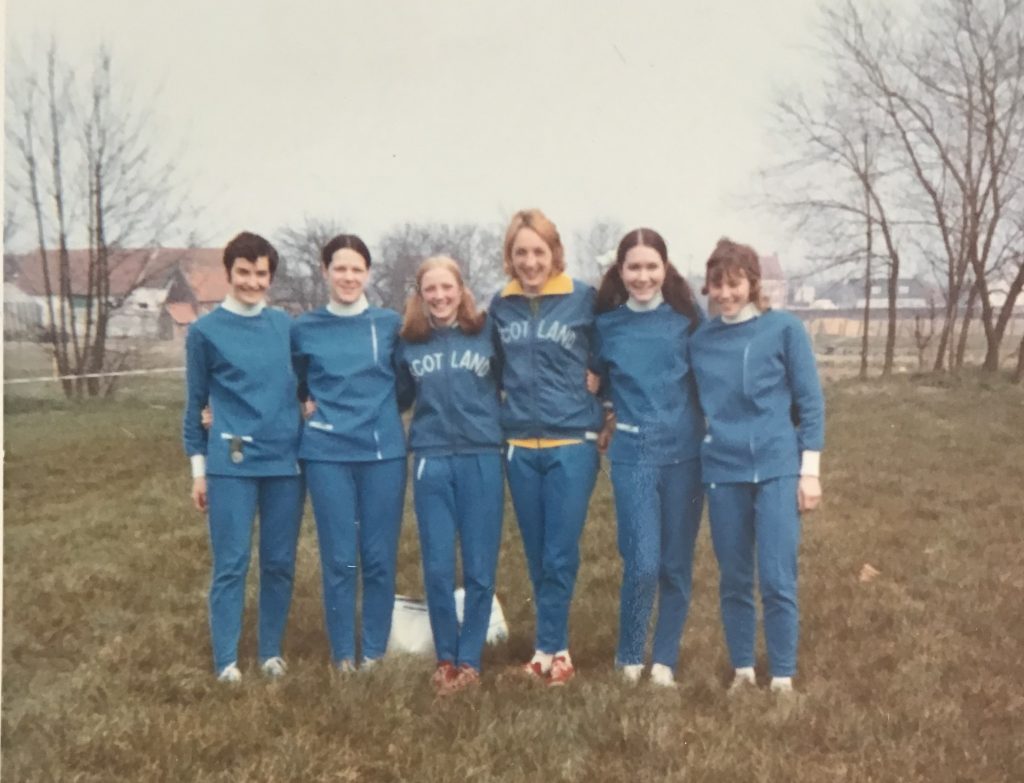
Scottish team with Margaret MacSherry, Moira O’Boyle and Palm Gunstone on the right
Rose McALEESE (26.04.54, Shettleston Harriers) was a good club member who ran in the 1980’s and on the track had a best of 10:08.67 for 3000m.
Elizabeth McARTHUR (6.11.63, Grangemouth HS, Forth Valley, Falkirk Victoria Harriers, Pitreavie AAC
Elizabeth ran all distances from 100m up to 3000m in the late 1970s and early 1980s. Best times were 55.28 *400m), 2:04.01 (800m), 2:50.10 (1000m i), 4:46.6 (1500m) and 10:24.57 (3000m). Competitively, the highlights of Elizabeth’s record were as recorded bu the scotstats website – Commonwealth Games 1986 800m (ht); Scottish championships: 1st 800 ‘80, 2nd 800 ‘82, 2nd 800 ’83. She was also a cross country runner who was a good solid club runner as these randomly taken places in the senior national indicate – 12th in 1980 and 17th ’82.
Her best 800m time of 2:04.1 was set when winning the UK Championship in Belfast on the 20th June 1986. UK Championships were held in the ’80s in an attempt to get away from the English AAA being considered as the British Champs but they didn’t really get supported – probably no appetite for them from England. She also won the Sen Indoor AAA 800m in 1985 with 2:08.63i but I don’t have the date for that event.
Audrey McBRIDE (7.11.73, Helensburgh AAC, Kilbarchan AAC) was a 1500m/3000m runner whose best times between 1998 and 2002 were were 4:44.7 and 10:11.8. Audrey also ran cross-country finishing 34th in 1999 which seems to have been her best year.
Elaine McBRINN (19.12.63, Shettleston, City of Glasgow) daughter of the legendary Willie McBrinn, Elaine had a good career as a distance runner with best times of 2:59:03 (marathon), 37:39.5 (10,000m), 17:51.0 (5000m), 10:01.8 (3000m) and 4:47.6 (1500m). On the road, she was second in the Scottish half marathon championship in 1992, was third in the Scottish 10K in 1993, and won the Scottish 10 miles championship in 1994. A good club runner, Elaine ran over the country with results like 14th in 1994, 16th in 1998, 10th in 2000. All very good positions in a competitive race. Shettleston Ladies won the team title 1994, 2000 and 2001. In the Scottish Masters XC Championships, Elaine won the W35 title in 1999 and added silver medals in 2001 and 2002. Shettleston Ladies won team gold in 1999 and 2001. Elaine also ran for Scottish Masters in the British and Irish Five Nations International. In 2002 she was 6th W35 and her Dad, Bill, was 6th M70.
Sheila L. A. McCLAFFERTY (1956 – , Pitreavie) was a runner who specialised in 3000m on the track in the mid-70’s with a best time of 11:21.13.
Mary McCLUNG (19.12.71, Kilmarnock, Edinburgh Southern, University of Georgia (USA) Mary was a Scottish international runner with a very good record of consistently high standard athletics. First appearing in the ranking lists in 1987, she appeared 45 times (18 in the top ten, with her last ranked performance in 2004. Her competitive record as reported in the scotsats.net website is as follows: Scottish championships: 1st 800 1994, 1st 800 ’97, 1st 800 ’99, 2nd 400 ’00, 2nd 800 ’95, 3rd 800 ’98; 2nd i400 ’00, 2nd i800 ’01. Starting as a sprinter her best times at all distances are – 200m – 25.2; 400m – 54.06, 400H – 66.0, 600m – 1:32.84, 800m – 2:03.92, 1500 – 4:25.13, 3000m – 10:32.6.
Patricia A. McCLUSKEY (25.05.40-11.1976, Tannahill Harriers, Greenock Rankin Park) Pat McCluskey (later Spence) was a very good runner in the 1960’s and 1970’s who was also a good coach. Her own times, all run on cinder tracks, were 2:27.3 for 800m, 5:31.1 for the Mile, 4:42.4 (1500m), and 10:35.8 (3000m) Her record in the Scottish championships was a good one – 2nd in the 3000 in ‘71, 3rd in the 1500, also in ‘71, 3rd in the 1500 in 72. Her country record is also a good one – Scottish cross-country championships: main performances in the 1960’s: 1960 2nd, 1961 1st, 1965 7th. She ran for Scotland in 1960 and 1961. (Pat Spence died tragically from complications after a minor operation). Her obituary was in Athletics Weekly. “Pat was a former Scottish Women’s CC Champion (1961), finished in the first three on other occasions and gained international vests for Scotland. She was one of the founder members of the SWCCU and was President in 1969, when the ICCU Championships were held in Clydebank. She helped to establish Greenock Rankin Park Harriers, a thriving women’s athletic club in her home town of Greenock, and built it up to a membership of over 100 athletes, including internationals whom she had personally coached. Possessing a warm, friendly, vivacious personality, Pat lived her life to the full, making many friends both in and out of the sport. She leaves behind two young daughters and her husband George, an enthusiastic athlete himself, who first interested Pat in the sport.”
Pamela McCROSSAN was born on 10/6/1961 and ran for Clydesdale Harriers and the Scottish Veteran Harriers Club and started running in the late 1990s. She became an Honorary Member of Clydesdale and Ladies Captain. Pamela was first lady in the Aberfeldy Marathon in 2012 at her first attempt at the distance. In the Scottish Masters XC Championship, Pamela secured W50 silver in 2013 xc; and won the W55 title in 2018 plus bronze in 2019. In 2018, she was first M50 in the Scottish 10 Miles Road Championship. Pamela McCrossan was part of a medal-winning team on each of the five occasions she represented Scotland at the British and Irish Masters International Cross-Country Championships.
Elizabeth McCOLGAN – see Lynch
Janet McCOLL – see Higgins
Jane McCRORIE (24.11.81, Central) was a runner at the turn of the century with best times of 4:45.14 (1500) and 10:37.4 (3000m).
Elizabeth McCULLOCH, (Bellahouston Harriers) , running in the 1970’s, had personal bests of 5:08.9 for 1500m, and 10:45.2 for 3000m.
Julie McDEVITT (15.03.73, Edinburgh Southern, Glasgow, City of Glasgow) Later Julie Barnett, was a versatile athlete, just as much at home on the track as on the road or over the country. Ranked on the track almost every year from 1989 to 2001 at 800m and 1500m with best times of 2:10.1 and 4:31.14. Her competitive record highlights included: Scottish championships: 3rd 800m in 1996; 2nd i800 ’95, 2nd i800 ’96, 3rd i1500 ’97.
Alison McDOUGALL (28.08.62, Stonelaw HS, Shettleston Harriers) ran 1977 to 1982 and mainly in 800m. Best times of 2:11.8 for 800m and 4:46.4 for 1500m.
Charlotte M. T. McFADDEN (21.03.68, Edinburgh University, City of Glasgow) was active between 1989 and 1999 running 1500m, 3000m and 5000m with best times of 4:47.85 for 1500m, 10:06.9 gor 3000m and 17:37.35 .
Heather McFARLANE (18.03.66, Marr College, Ayr Seaforth) ran in the 1980’s with a wide range of personal best times – 800m in 2:17.5, 4:44.23 for 1500m and 3:07:38 for the marathon.
Wendy McFARLANE (22.08.69, City of Glasgow) had a personal best of 4:44.7 for 1500m in 1995
Aileen McFEAT (1961-)St Mungo’s HS, Central Region) a best of 11:57.8 for 3000m in 1976.
Angela McGEOWN (3.12.64, Trinity HS, Paisley,Shettleston) was second in the SWAAA in 1984 and was ranked at national level between 1978 and 1984 with best times of 57.2 (400m) and 2:10.75 (800m).
Hilary McGRATH (9.6.63, Law & District AC). As a Scottish Masters athlete, she won many W45 and W50 Indoor and Outdoor Track titles over 1500m and 3000m. In the Cross-Country Championships, Hilary won W45 bronze in 2011; and W50 silver in 2014. For Scottish Masters in 2013, Hilary McGrath was part of a W50 Cross-Country team that won silver medals in the British and Irish International at Cardiff. They repeated this performance in 2014 at Nottingham.
Nancy McGRAW (Teviotdale Harriers) was a good marathon runner for the Borders club with a best time of 3:07:53 and other performances between 1980 and 1987.
Susan McGRENAGHAN (11.07.83, Kilbarchan AC) was one of the pioneers of women’s steeplechase with performances over 200m and 300m barriers where she was ranked in the top three in the country. Her personal bests across the range including the ‘chase were 2:19.2 (800), 4:41.59 (1500m), 10:33.6 (3000m), 8:11.6 (2000m steeplechase) and 12:15.79 (3000m steeplechase). She was running between 1998 to 2002. It is unfortunate that there were no national championships for her to run in.
Hazel McHENRY (2.06.69, Victoria Park) was a 400/800 specialist with best performances of 57.1 and 2:11.9.
Karen A. McINALLY (14.09.76, Nith Valley) was a middle distance runner who ran mainly 800m and 1500m events with best times of 2:19.3 and 4:41.09.
Iona E. McINTYRE (14.03.83, Edinburgh Southern, Dunfermline & West Fife)
Toni McINTOSH was born on 26/11/1979 and ran for Stirling University, Ayr Seaforth and Central AC. In 2003, she finished fifth in the Scottish Senior National XC and then ran for Scotland at Belfast. Toni finished 25th (third Scot) and the team lost to Kenya, Ireland and England but beat Wales and Northern Ireland. She won individual silver in the 2009 National, then finished first Scot (6th place) in the Home International in Bangor, Wales. Undoubtedly, her favourite surface was road. In 2004, she raced an Ekiden Relay at Brussels; Scotland lost to Ireland but beat Belgium and France. Toni McIntosh won several Scottish titles: 10k in 2000 and 2009; half marathon in 2003, 2004 and 2009; and the marathon in 2009 (2.47.18). In the Scottish rankings, she was third for 10,000m (2004) and marathon (2009).
Sonia McLAREN (Armitage from 1991) was born on 27/10/1960 and ran for Aberdeen AAC and Cosmic Hill Bashers. She was a very classy athlete for many years. Sonia won the Scottish Indoor 1500m in 2010; secured bronze medals at 3000m; and in 1979 raced 3000m for Scotland v Wales and Israel. She ran for Scotland as a in the World Cross-Country Championships; five times in the World Hill Running Trophy; and three times in the European Hill Running Trophy. In 1996, Sonia won the Scottish Hill Running title. She was a World Masters Champion in Mountain Running and both Outdoor and Indoor track. In Scotland she won the Masters Cross Country title in 1996 (W35), 2001 and 2003 (W40), as well as Team gold with Aberdeen AAC in 1996. She helped Scottish Masters to secure several team medals in the annual 5 Nations CC International. Naturally she won umpteen Scottish Masters titles on the track, indoors and outdoors. She was a speedy, elegant runner who overcame several injuries, competed brilliantly, thoroughly deserved every success but was always modest and friendly.
Inez McLEAN, (7.09.55, Unattached) was a very good runner of marathons during the 1980’s at a time when the standard was high. Her competitive record looks like this : 1982, Marathon, 2.46.32, ranked 2nd; 1983 Marathon 2.42.42, 1st; 1984 Marathon 2.57.45 8th; 1985 Marathon 2.38.17 2nd; 1986 Marathon 2.52.4 7 7. Five years, five top ten rankings including one first and two seconds.
Elizabeth McLEOD, unattached. In 1955, at Ayr, she finished 9th (third Scot) in the cross-country International match v England. (In the previous 1955 Scottish National Cross-Country she had been third.) Later, in the 1955 Scottish Athletics 880 yards championship, she won a silver medal behind Aileen Drummond.
Fiona McLEOD, (Penicuik HS, Edinburgh Southern)
Fiona is only raked for two years in 1973 and 1974 when her her best times were 2:21.42 for 800m and 61.4 for 400m.
Christine McMEEKIN, (1.12.56 Hillhead HS, Maryhill Ladies, Glasgow, Windsor Slough & Eton) was a very good athlete in club and international terms. Her competitive record reads: Olympics 1976 800 (ht); Commonwealth Games ’78 1500m (4th); Commonwealth Games 1986 1500 (ht). GB Championships: 2nd 1500m ’86, 2nd UK 1500 ’86; Scottish Championships: 1st 800m ‘75, ‘77, ’86; 2nd 400m ‘73, 2nd 1500m ‘82; 3rd 1500 ’78, ’88; 1st 600i ’74, ’75, 2nd 600i ’73. Christine is twin sister of
Evelyn McMEEKIN (1.12.56, Hillhead HS, Maryhill Ladies, Glasgow) was also a very good athlete who unfortunately had injury problems which affected her career. Her career record reads: Commonwealth Games 1974 400m (sf), 4×400 (4th); 1978 800m (6th), 4x400m (4th). Scottish championships: 1st 800 1976, ‘78, 3rd 800 ’73; 1st 300i ’74, 1st 600i ’73
Read the full profile for Christine and Evelyn at this link
Hazel McNEE, (Marr College, Loughborough Univ, Ayr Seaforth AC) competed for Ayr Seaforth between 1978 and 1982 over a range of middle distance races with best times of 2:15.0 (800m), 4:44.5 (1500m), 10:56.0 (3000m) and 69.1 (400mH).
Pamela McNELLIS, (28.04.83, Inverclyde, City of Glasgow, Victoria Park City of Glasgow) , later Nicholson, raced over 800m, 1500m, 3000m and 5000m between 1998 and 2007. Pamela was second in the Scottish 1500m in 2003 and had best times of 2:14.7 *800m), 4:34.98 (1500m), 9:54.72 (3000m) and 17:35.06 (5000m).
Jeanette McPHERSON (Birchfield) was ranked between 1969 and 1972 and had best times of 2:19.4 (800m) and 60.5 (400m).
Vikki McPHERSON (1.06.71, Troon Tortoises, Glasgow, Glasgow University, City of Glasgow) was an athlete of the highest calibre who was a credit to Scotland wherever she competed. Her competition record highlights were as follows. World Championships, 1993, 10000m (ht); Commonwealth Games, ’94, 10000m (5th); Commonwealth Games, ’98, 10000m (4th); World Student Games ’93 10000m (4th); GB Championships: 1st, 10000m, ’93; 1st, UK 10000 ’97, 3rd 10000 ’96. Scottish Championships: 3rd 3000m ’91.
Read Vikki’s full profile here .
Fiona McQUEEN (10.02.61, Hyndland Sec Sch, Victoria Park AAC) was a good athlete and part of a very good group at Victoria Park coached by Ronnie Kane. Her competitive record highlights include SWAAA Championship performances – 1st 3000m, 1981; 2nd 1500 ‘79; 2nd 3000m ‘78; 3rd 1500m ‘83; 3rd 3000 ’80. She had best performances on the track 25 times between 1975 and 1984 at distances between 800m and 3000m, and was in the top three six times. Personal best times: 800m – 2:11.9, 1500m – 4:18.74, Mile – 4:51.99, 3000m – 9:23.95.
Good as she was on the track, Fiona was possibly better on the country. She ran for Scotland in the World Championships no fewer than 5 times – 1978 (79th), 1979 (57th), 1980 (73rd), 1983 (51st), 1984 (41st). Domestically she won the national under 17 title twice (1977 and 1978), and the senior title once (1983). In addition she was second in 1980 and third in 1979. Fiona was a remarkable athlete. Read her full profile.
Renee Murray, Giffnock North, was a consistently good runner on road, track and country. Her best marathon was in 1992 when she recorded 2:55:23 to be fourth fastest Scot over the distance. In 1990 she was second in the SWAAA 10,000m in 38:58.14 to be fifth fastest Scot for the year.
